Here are my favorite love poems for her categorized:
- Passionate love poems for her
- Short love poems for her
- Romantic poems for her
- Long love poems for her
- Poems to make her feel special
- Love poems and sonnets by Shakespeare
- Deep love poems for her by Edmund Spenser
So if you want the best love poems for her, then you’re in the right place.
Let’s jump right in!
- 43 Thoughtful Poems About Ex Girlfriends
- 109 Soulful Love Poems of All Time for Her
- 41 Intimate Poems About Ex Lovers for Her
- 47 Brave Poems About Letting Someone Go for Her
- 73 Charming Love Poems For Girlfriends
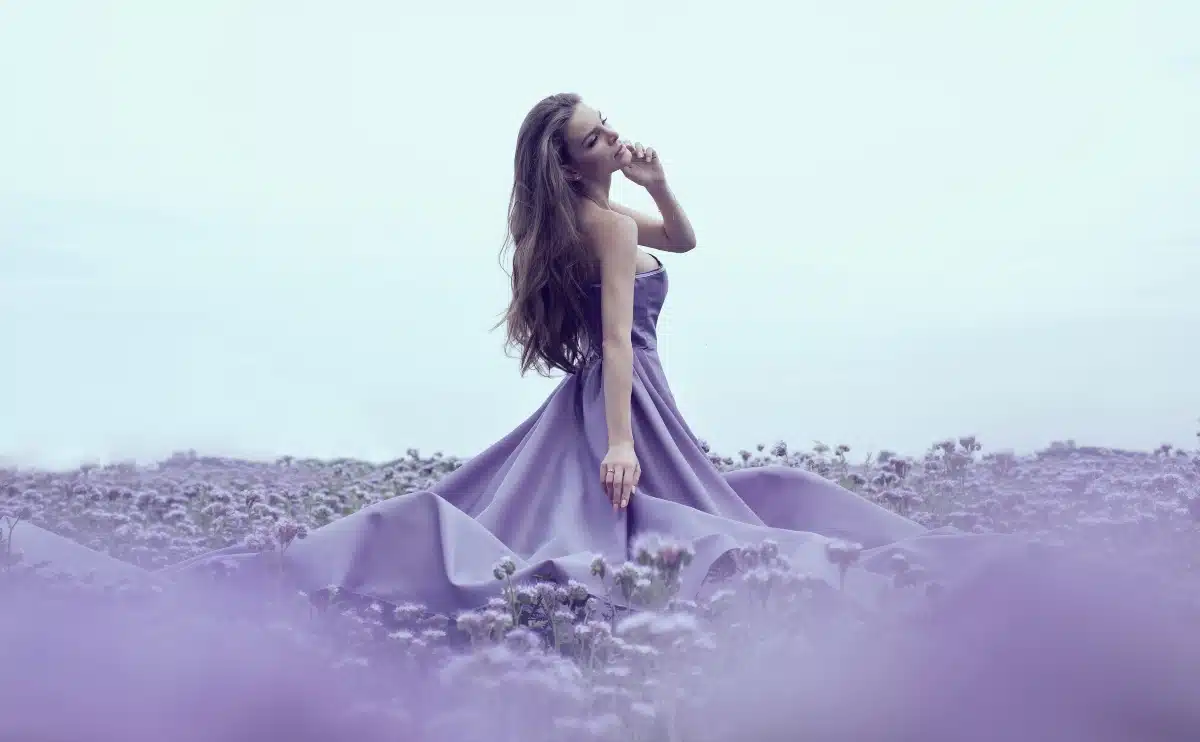
Luring Love Poems For Her
Discover the most heartfelt and captivating love poems for her, all in one place!
From passionate declarations of love to deep and soulful verses, this collection offers a hand-picked selection of the best poems about love for her.
Whether you’re seeking to express your own feelings or simply wish to savor the beauty of love through poetry, you’ll find everything you need right here.
Keep reading and enjoy!
My #1 Favorite Love Poem For Her
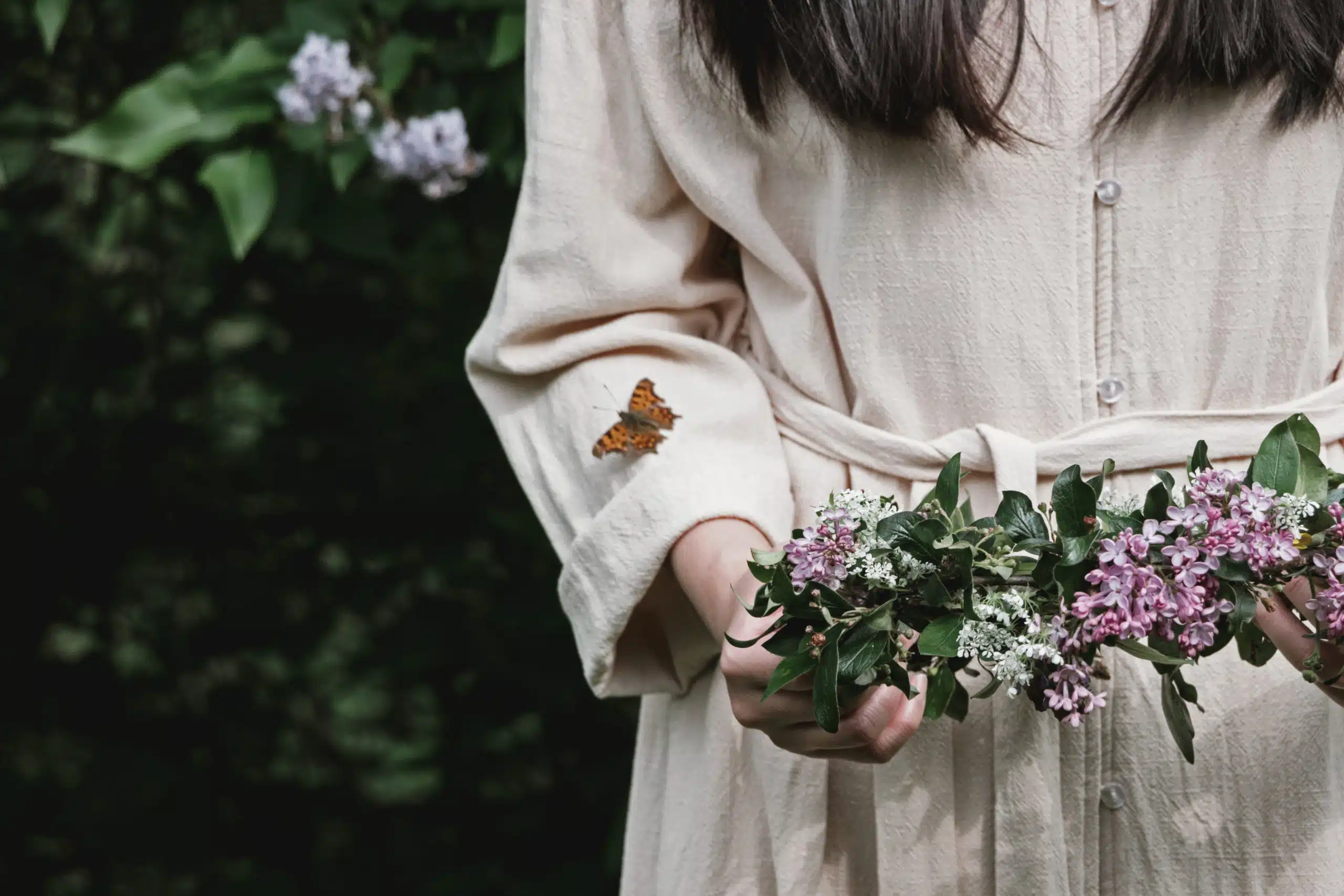
“There is a Garden in Her Face” by Richard Allison
There is a garden in her face,
Where roses and white lilies blow;
A heavenly paradise is that place,
Wherein all pleasant fruits do grow;
There cherries grow that none may buy,
Till cherry-ripe themselves do cry.
Those cherries fairly do enclose
Of orient pearl a double row,
Which when her lovely laughter shows,
They look like rosebuds filled with snow;
Yet them no peer nor prince may buy,
Till cherry-ripe themselves do cry.
Her eyes like angels watch them still,
Her brows like bended bows do stand,
Threatening with piercing frowns to kill
All that approach with eye or hand
These sacred cherries to come nigh,
Till cherry-ripe themselves do cry.
Passionate Love Poems For Her

“My Lady” by Dante Alighieri
So gentle and so gracious doth appear
My lady when she giveth her salute,
That every tongue becometh, trembling, mute;
Nor do the eyes to look upon her dare.
Although she hears her praises, she doth go
Benignly vested with humility;
And like a thing come down she seems to be
From heaven to earth, a miracle to show.
So pleaseth she whoever cometh nigh,
She gives the heart a sweetness through the eyes,
Which none can understand who doth not prove.
And from her countenance there seems to move
A spirit sweet and in Love’s very guise,
Who to the soul, in going, sayeth: Sigh!
“My Sweetheart’s Face” by John Allan Wyeth
My kingdom is my sweetheart’s face,
And these the boundaries I trace:
Northward her forehead fair;
Beyond a wilderness of auburn hair;
A rosy cheek to east and west;
Her little mouth
The sunny south.
It is the south that I love best.
Her eyes two crystal lakes,
Rippling with light,
Caught from the sun by day,
The stars by night.
The dimples in
Her cheeks and chin
Are snares which Love hath set,
And I have fallen in!
“Ae Fond Kiss” by Robert Burns
Ae fond kiss, and then we sever;
Ae fareweel, alas, for ever!
Deep in heart-wrung tears I’ll pledge thee,
Warring sighs and groans I’ll wage thee!
Who shall say that Fortune grieves him
While the star of hope she leaves him?
Me, nae cheerfu’ twinkle lights me,
Dark despair around benights me.
I’ll ne’er blame my partial fancy;
Naething could resist my Nancy;
But to see her was to love her,
Love but her, and love for ever.
Had we never loved sae kindly,
Had we never loved sae blindly,
Never met—or never parted,
We had ne’er been broken-hearted.
Fare thee weel, thou first and fairest!
Fare thee weel, thou best and dearest!
Thine be ilka joy and treasure,
Peace, enjoyment, love, and pleasure!
Ae fond kiss, and then we sever!
Ae fareweel, alas, for ever!
Deep in heart-wrung tears I’ll pledge thee,
Warring sighs and groans I’ll wage thee!
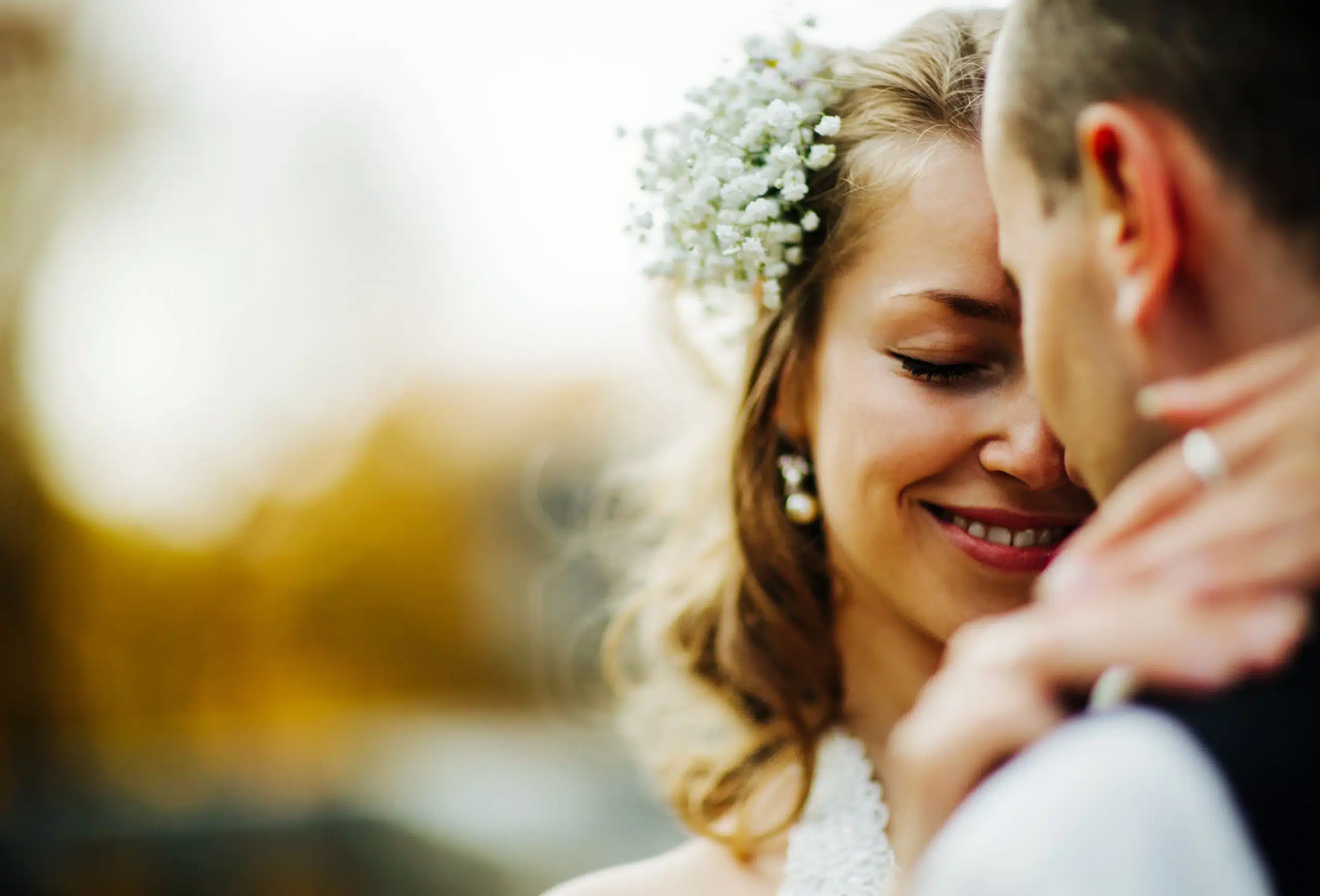
“The Maiden I Love” by John Clare
How sweet are Spring wild flowers! They grow past the counting.
How sweet are the wood-paths that thread through the grove!
But sweeter than all the wild flowers of the mountain
Is the beauty that walks here–the maiden I love.
Her black hair in tangles
The rose briar mangles;
Her lips and soft cheeks,
Where love ever speaks:
O there’s nothing so sweet as the maiden I love.
It was down in the wild flowers, among brakes and brambles,
I met the sweet maiden so dear to my eye,
In one of my Sunday morn midsummer rambles,
Among the sweet wild blossoms blooming close by.
Her hair it was coal black,
Hung loose down her back;
In her hand she held posies
Of blooming primroses,
The maiden who passed on the morning of love.
Coal black was her silk hair that shaded white shoulders;
Ruby red were her ripe lips, her cheeks of soft hue;
Her sweet smiles, enchanting the eyes of beholders,
Thrilled my heart as she rambled the wild blossoms through.
Like the pearl, her bright eye;
In trembling delight I
Kissed her cheek, like a rose
In its gentlest repose.
O there’s nothing so sweet as the maiden I love!
“The Harmony of Love” by Thomas Lodge
A very phoenix, in her radiant eyes
I leave mine age, and get my life again;
True Hesperus, I watch her fall and rise,
And with my tears extinguish all my pain;
My lips for shadows shield her springing roses,
Mine eyes for watchmen guard her while she sleepeth,
My reasons serve to ’quite her faint supposes;
Her fancy, mine; my faith her fancy keepeth;
She flower, I branch; her sweet my sour supporteth,
O happy Love, where such delights consorteth!
“Sonnet Upon a Stolen Kiss” by George Wither
Now gentle sleep hath closèd up those eyes
Which, waking, kept my boldest thoughts in awe;
And free access unto that sweet lip lies,
From whence I long the rosy breath to draw.
Methinks no wrong it were, if I should steal
From those two melting rubies one poor kiss;
None sees the theft that would the theft reveal,
Nor rob I her of aught what she can miss:
Nay, should I twenty kisses take away,
There would be little sign I would do so;
Why then should I this robbery delay?
O, she may awake, and therewith angry grow!
Well, if she do, I ’ll back restore that one,
And twenty hundred thousand more for loan.

“A Violet in Her Hair” by Charles Swain
A violet in her lovely hair,
A rose upon her bosom fair!
But O, her eyes
A lovelier violet disclose,
And her ripe lips the sweetest rose
That ’s ’neath the skies.
A lute beneath her graceful hand
Breathes music forth at her command;
But still her tongue
Far richer music calls to birth 10
Than all the minstrel power on earth
Can give to song.
And thus she moves in tender light,
The purest ray, where all is bright,
Serene, and sweet;
And sheds a graceful influence round,
That hallows e’en the very ground
Beneath her feet!
“Song: Sweetest Love, I Do Not Go” by John Donne
Sweetest love, I do not go
For weariness of thee,
Nor in hope the world can show
A fitter love for me;
But since that I
Must die at last, ’tis best
Thus to use myself in jest
By feigned deaths to die.
Yesternight the Sun went hence
And yet is here to-day,
He hath no desire nor sense,
Nor half so short a way;
Then fear not me,
But believe that I shall make
Hastier journeys, since I take
More wings and spurs than he.
O how feeble is man’s power,
That if good fortune fall,
Cannot ado another hour,
Nor a lost hour recall!
But come bad chance,
And we join to ’t our strength,
And we teach it art and length,
Itself o’er us t’ advance.
When thou sigh’st thou sigh’st not wind,
But sigh’st my soul away;
When thou weep’st unkindly kind,
My life’s blood doth decay.
It cannot be
That thou lov’st me, as thou say’st;
If in thine my life thou waste,
Thou art the life of me.
Let not thy divining heart
Forethink me any ill,
Destiny may take my part
And may thy fears fulfil;
But think that we
Are but laid aside to sleep:
They who one another keep
Alive, ne’er parted be.
“Lovers’ Infiniteness” by John Donne
If yet I have not all the love,
Dear, I shall never have it all,
I cannot breathe one other sigh, to move,
Nor can entreat one other tear to fall.
All my treasure, which should purchase thee,
Sighs, tears, and oaths, and letters I have spent,
Yet no more can be due to me,
Than at the bargain made was meant.
If then thy gift of love were partial,
That some to me, some should to others fall,
Dear, I shall never have thee all.
Or if then thou gavest me all,
All was but all, which thou hadst then;
But if in thy heart, since, there be or shall
New love created be, by other men,
Which have their stocks entire, and can in tears,
In sighs, in oaths, and letters outbid me,
This new love may beget new fears,
For, this love was not vowed by thee.
And yet it was, thy gift being general,
The ground, thy heart is mine; whatever shall
Grow there, dear, I should have it all.
Yet I would not have all yet,
He that hath all can have no more,
And since my love doth every day admit
New growth, thou shouldst have new rewards in store;
Thou canst not every day give me thy heart,
If thou canst give it, then thou never gav’st it;
Love’s riddles are, that though thy heart depart,
It stays at home, and thou with losing sav’st it:
But we will have a way more liberal,
Than changing hearts, to join them, so we shall
Be one, and another’s all.
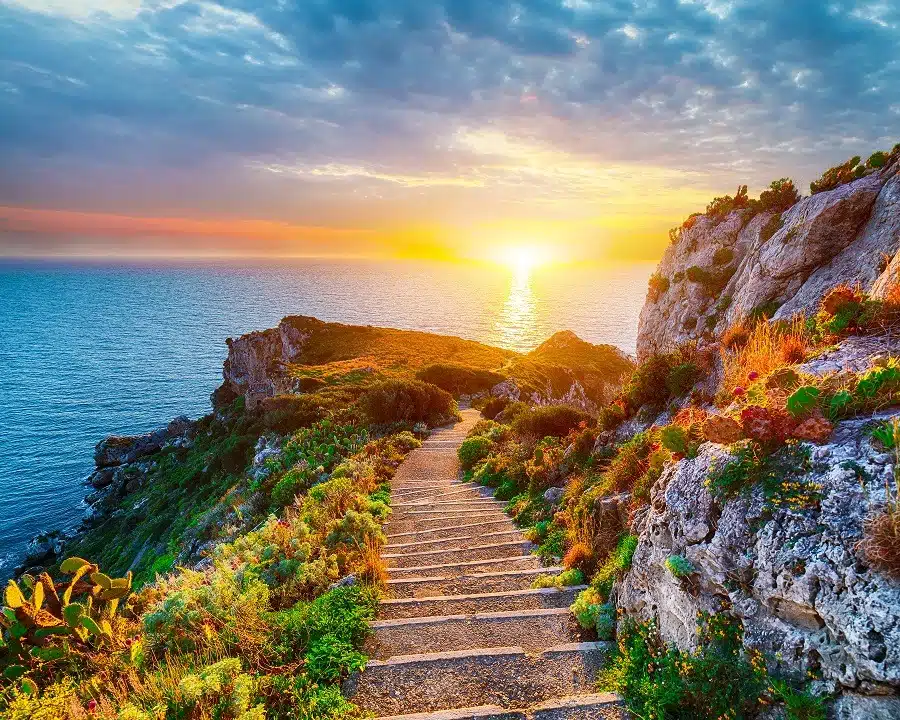
“Daybreak” by Sir William Davenant
The lark now leaves his watery nest,
And climbing shakes his dewy wings,
He takes your window for the east,
And to implore your light, he sings;
Awake, awake, the morn will never rise,
Till she can dress her beauty at your eyes.
The merchant bows unto the seaman’s star,
The ploughman from the sun his season takes;
But still the lover wonders what they are,
Who look for day before his mistress wakes:
Awake, awake, break through your veils of lawn!
Then draw your curtains and begin the dawn.
“Let Us Live and Love” by Gaius Valerius Catullus
My sweetest Lesbia, let us live and love;
And though the sager sort our deeds reprove,
Let us not weigh them. Heaven’s great lamps do dive
Into their west, and straight again revive;
But, soon as once set is our little light,
Then must we sleep one ever-during night.
If all would lead their lives in love like me,
Then bloody swords and armor should not be;
No drum nor trumpet peaceful sleeps should move,
Unless alarm came from camp of love.
But fools do live and waster their little light,
And seek with pain their ever-during night.
When timely death my life and fortune ends,
Let not my hearse be vexed with mourning friends;
But let all lovers rich in triumph come,
And with sweet pastime grace my happy tomb.
And, Lesbia, close up thou my little light,
And crown with love by ever-during night.
“In a Boat” by D. H. Lawrence
See the stars, love,
In the water much clearer and brighter
Than those above us, and whiter,
Like nenuphars.
Star-shadows shine, love,
How many stars in your bowl?
How many shadows in your soul,
Only mine, love, mine?
When I move the oars, love,
See how the stars are tossed,
Distorted, the brightest lost.
—So that bright one of yours, love.
The poor waters spill
The stars, waters broken, forsaken.
—The heavens are not shaken, you say, love,
Its stars stand still.
There, did you see
That spark fly up at us; even
Stars are not safe in heaven.
—What of yours, then, love, yours?
What then, love, if soon
Your light be tossed over a wave?
Will you count the darkness a grave,
And swoon, love, swoon?
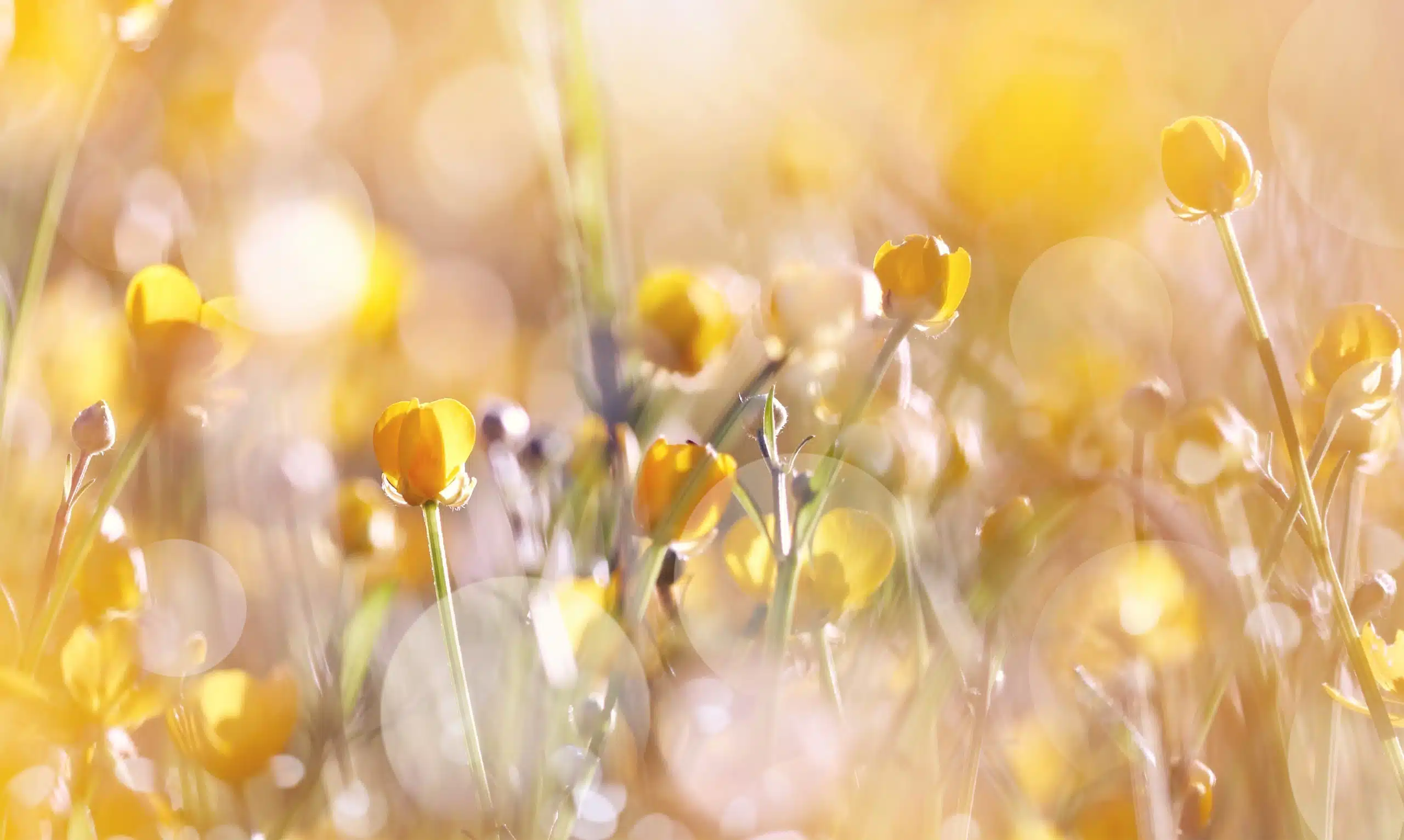
“On Some Buttercups” by Frank Dempster Sherman
A little way below her chin,
Caught in her bosom’s snowy hem,
Some buttercups are fastened in,—
Ah, how I envy them!
They do not miss their meadow place,
Nor are they conscious that their skies
Are not the heavens, but her face,
Her hair, and mild blue eyes.
There, in the downy meshes pinned,
Such sweet illusions haunt their rest;
They think her breath the fragrant wind,
And tremble on her breast;
As if, close to her heart, they heard
A captive secret slip its cell,
And with desire were sudden stirred
To find a voice and tell!
“Valentines From An Inconstant-Constant” by Arthur Macy
Though I love many maidens fair
As fondly as a heart may dare,
Yet still are you the only one
True goddess of my pantheon.
And though my life is like a song,
Each maid a stanza, clear and strong,
Yet always I return again
To you who are the sweet refrain.
“To Anthea” by Robert Herrick
Bid me to live, and I will live
Thy Protestant to be;
Or bid me love, and I will give
A loving heart to thee.
A heart as soft, a heart as kind,
A heart as sound and free
As in the whole world thou canst find,
That heart I’ll give to thee.
Bid that heart stay, and it will stay,
To honour thy decree;
Or bid it languish quite away.
And ‘t shall do so for thee.
Bid me to weep, and I will weep
While I have eyes to see;
And having none, yet I will keep
A heart to weep for thee.
Bid me despair, and I’ll despair,
Under that cypress tree;
Or bid me die, and I will dare
E’en Death, to die for thee.
Thou art my life, my love, my heart,
The very eyes of me,
And hast command of every part,
To live and die for thee.
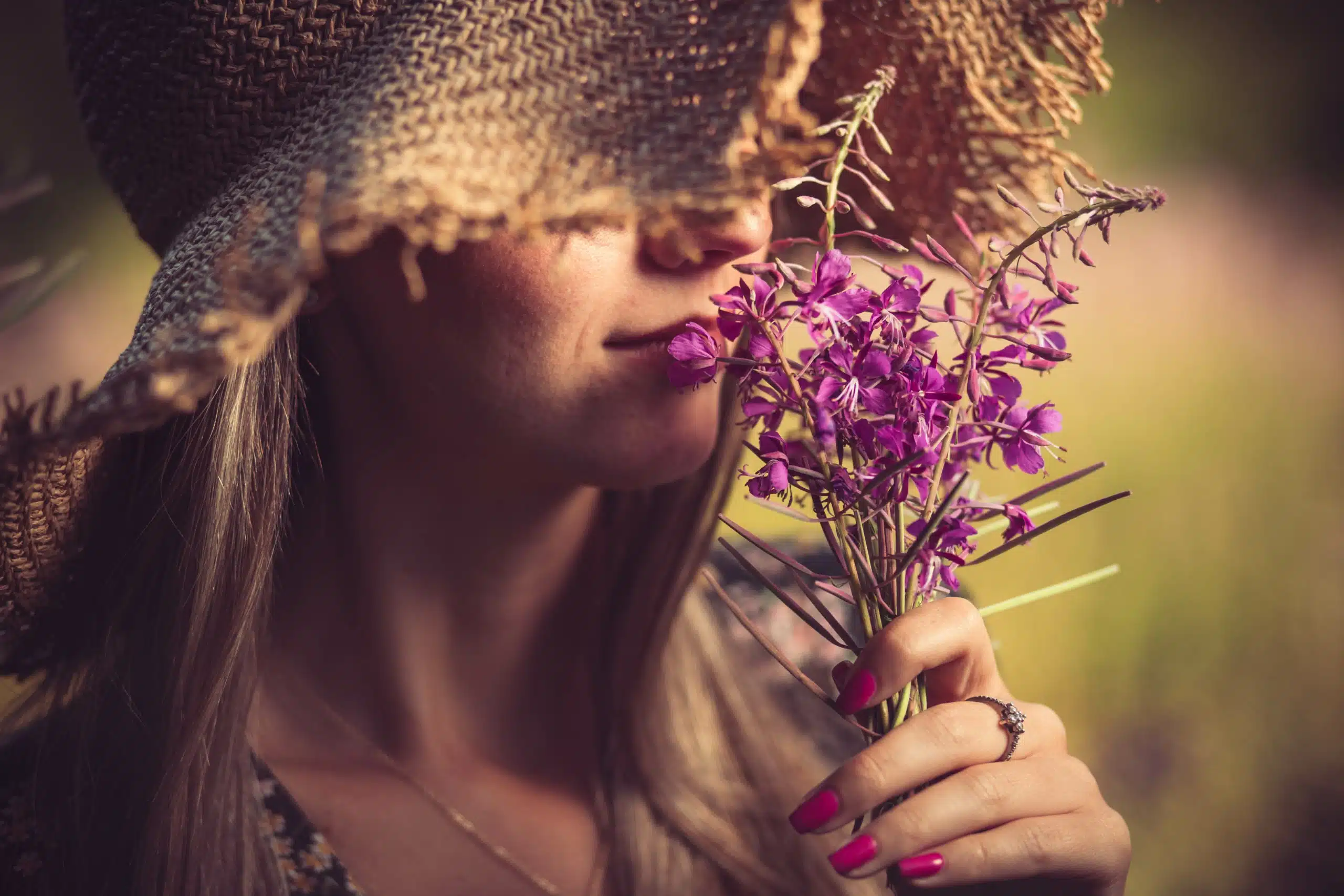
“Perfume” by Sir Edmund William Gosse
What gift for passionate lovers shall we find?
Not flowers nor books of verse suffice for me,
Nor splinters of the odorous cedar-tree,
And tufts of pine-buds, oozy in the wind;
Give me young shoots of aromatic rind,
Or samphire, redolent of sand and sea,
For all such fragrances I deem to be
Fit with my sharp desire to be combined.
My heart is like a poet, whose one room,
Scented with Latakia faint and fine,
Dried rose-leaves, and spilt attar, and old wine,
From curtained windows gathers its warm gloom
Round all but one sweet picture where incline
His thoughts and fancies mingled with perfume.
“Ah, How Sweet” by John Dryden
Ah, how sweet it is to love!
Ah, how gay is young desire!
And what pleasing pains we prove
When we first approach love’s fire!
Pains of love be sweeter far
Than all other pleasures are.
Sighs which are from lovers blown
Do but gently heave the heart:
E’en the tears they shed alone
Cure, like trickling balm, their smart.
Lovers, when they lose their breath,
Bleed away in easy death.
Love and Time with reverence use,
Treat them like a parting friend;
Nor the golden gifts refuse
Which in youth sincere they send:
For each year their price is more,
And they less simple than before.
Love, like spring-tides full and high,
Swells in every youthful vein;
But each tide does less supply,
Till they quite shrink in again.
If a flow in age appear,
’T is but rain, and runs not clear.
“My Choice” by William Browne
Shall I tell you whom I love?
Hearken then awhile to me;
And if such a woman move
As I now shall versify,
Be assured ’t is she or none,
That I love, and love alone.
Nature did her so much right
As she scorns the help of art.
In as many virtues dight
As e’er yet embraced a heart.
So much good so truly tried,
Some for less were deified.
Wit she hath, without desire
To make known how much she hath;
And her anger flames no higher
Than may fitly sweeten wrath.
Full of pity as may be,
Though perhaps not so to me.
Reason masters every sense,
And her virtues grace her birth;
Lovely as all excellence,
Modest in her most of mirth.
Likelihood enough to prove
Only worth could kindle love.
Such she is; and if you know
Such a one as I have sung;
Be she brown, or fair, or so
That she be but somewhat young;
Be assured ’t is she, or none,
That I love, and love alone.

“Song” by Walther von der Vogelweide (Edgar Taylor, Translator)
When from the sod the flowerets spring,
And smile to meet the sun’s bright ray,
When birds their sweetest carols sing,
In all the morning pride of May,
What lovelier than the prospect there?
Can earth boast anything more fair?
To me it seems an almost heaven,
So beauteous to my eyes that vision bright is given.
But when a lady chaste and fair,
Noble, and clad in rich attire,
Walks through the throng with gracious air,
As sun that bids the stars retire,—
Then where are all thy boastings, May?
What hast thou beautiful and gay,
Compared with that supreme delight?
We leave thy loveliest flowers, and watch that lady bright.
Wouldst thou believe me,—come and place
Before thee all this pride of May,
Then look but on my lady’s face,
And which is best and brightest say.
For me, how soon (if choice were mine)
This would I take, and that resign;
And say, “Though sweet thy beauties, May,
I ’d rather forfeit all than lose my lady gay!”
“Drink To Me Only With Thine Eyes” by Ben Jonson
Drink to me only with thine eyes,
And I will pledge with mine;
Or leave a kiss but in the cup,
And I ’ll not look for wine.
The thirst that from the soul doth rise
Doth ask a drink divine;
But might I of Jove’s nectar sup,
I would not change for thine.
I sent thee late a rosy wreath,
Not so much honoring thee
As giving it a hope that there
It could not withered be;
But thou thereon didst only breathe
And sent’st it back to me;
Since when it grows, and smells, I swear,
Not of itself but thee!
“The True Beauty” by T. Carew
He that loves a rosy cheek
Or a coral lip admires,
Or from starlike eyes doth seek
Fuel to maintain his fires;
As old Time makes these decay,
So his flames must waste away.
But a smooth and steadfast mind,
Gentle thoughts, and calm desires,
Hearts with equal love combined,
Kindle never-dying fires:
Where these are not, I despise
Lovely cheeks or lips or eyes.
Short Love Poems For Her

“Break Of Day!” by John Donne
Stay, O sweet, and do not rise ;
The light that shines comes from thine eyes ;
The day breaks not, it is my heart,
Because that you and I must part.
Stay, or else my joys will die,
And perish in their infancy.
“Kisses” by William Strode
My love and I for kisses played:
She would keep stakes—I was content;
But when I won, she would be paid;
This made me ask her what she meant.
“Pray since I see,” quoth she, “your wrangling vein,
Take your own kisses; give me mine again.”
“The White Rose” by Anonymous
If this fair rose offend thy sight,
Placed in thy bosom bare,
’T will blush to find itself less white,
And turn Lancastrian there.
But if thy ruby lip it spy,
As kiss it thou mayest deign,
With envy pale ’t will lose its dye,
And Yorkish turn again.

“A Vision of Beauty” by Ben Jonson
It was a beauty that I saw,—
So pure, so perfect, as the frame
Of all the universe were lame
To that one figure, could I draw,
Or give least line of it a law:
A skein of silk without a knot!
A fair march made without a halt!
A curious form without a fault!
A printed book without a blot!
All beauty!—and without a spot.
“Take, O Take Those Lips Away” by William Shakespeare
Take, O take those lips away,
That so sweetly were forsworn;
And those eyes, the break of day,
Lights that do mislead the morn:
But my kisses bring again,
bring again,
Seals of love, but seal’d in vain,
seal’d in vain.
“Desire” by Samuel Taylor Coleridge
Where true Love burns Desire is Love’s pure flame ;
It is the reflex of our earthly frame,
That takes its meaning from the nobler part,
And but translates the language of the heart.
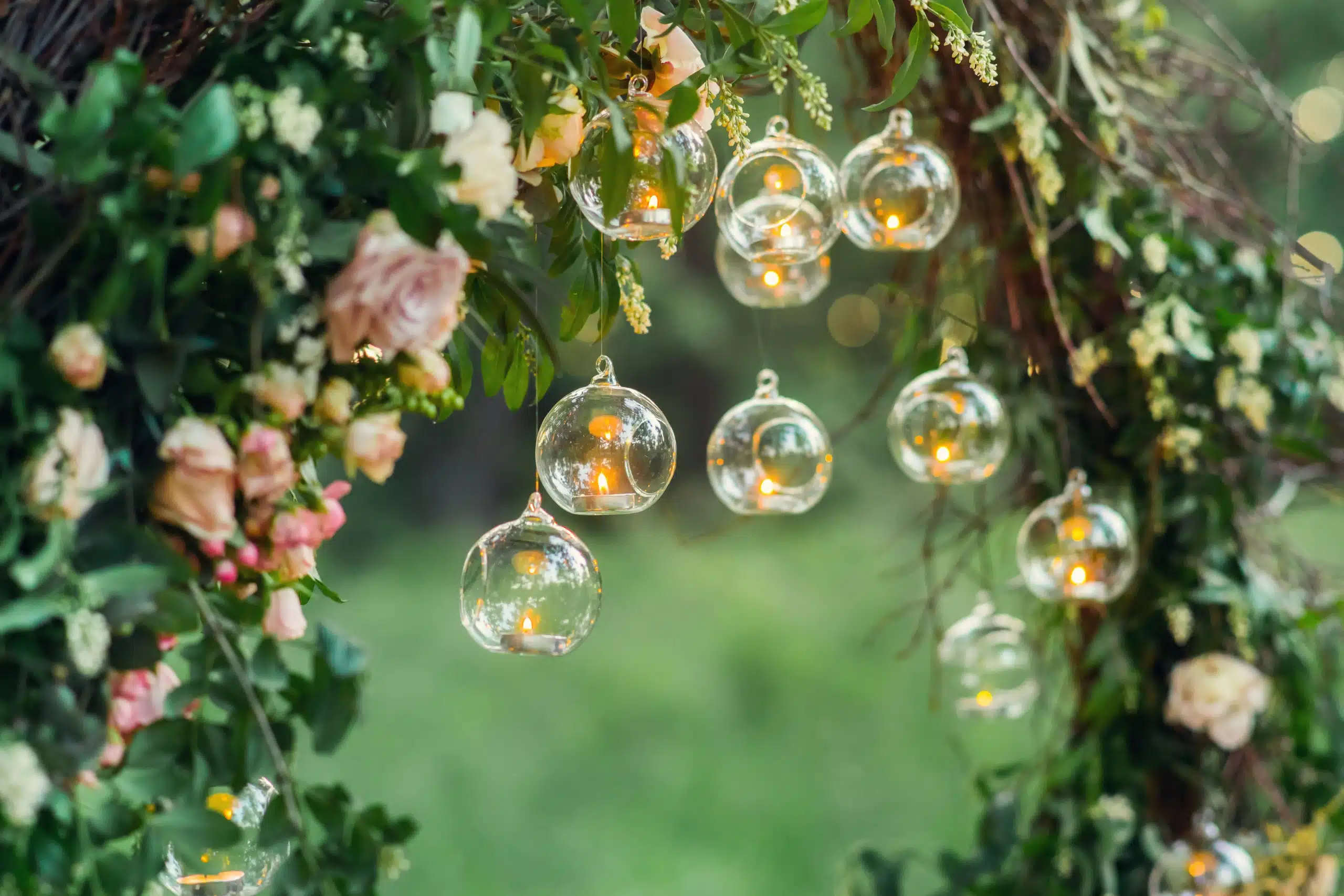
“Love” by Christopher Marlowe
It lies not in our power to love or hate,
For will in us is over-ruled by fate.
When two are stript long e’er the course begin,
We wish that one should lose, the other win;
And one especially do we affect
Of two gold ingots, like in each respect:
The reason no man knows; let it suffice,
What we behold is censured by our eyes.
Where both deliberate, the love is slight:
Who ever loved, that loved not at first sight?
“Love’s Silence” by Sir Philip Sidney
Because I breathe not love to everie one,
Nor do not use set colors for to weare,
Nor nourish special locks of vowèd haire,
Nor give each speech a full point of a groane,—
The courtlie nymphs, acquainted with the moane
Of them who on their lips Love’s standard beare,
“What! he?” say they of me. “Now I dare sweare
He cannot love: No, no! let him alone.”
And think so still,—if Stella know my minde.
Profess, indeed, I do not Cupid’s art;
But you, faire maids, at length this true shall finde,—
That his right badge is but worne in the hearte.
Dumb swans, not chattering pies, do lovers prove:
They love indeed who quake to say they love.
“Love Not Me For Comely Grace” by Anonymous
Love not me for comely grace,
For my pleasing eye or face,
Nor for any outward part,
No, nor for my constant heart;
For those may fail or turn to ill, 5
So thou and I shall sever;
Keep therefore a true woman’s eye,
And love me still, but know not why.
So hast thou the same reason still
To dote upon me ever.
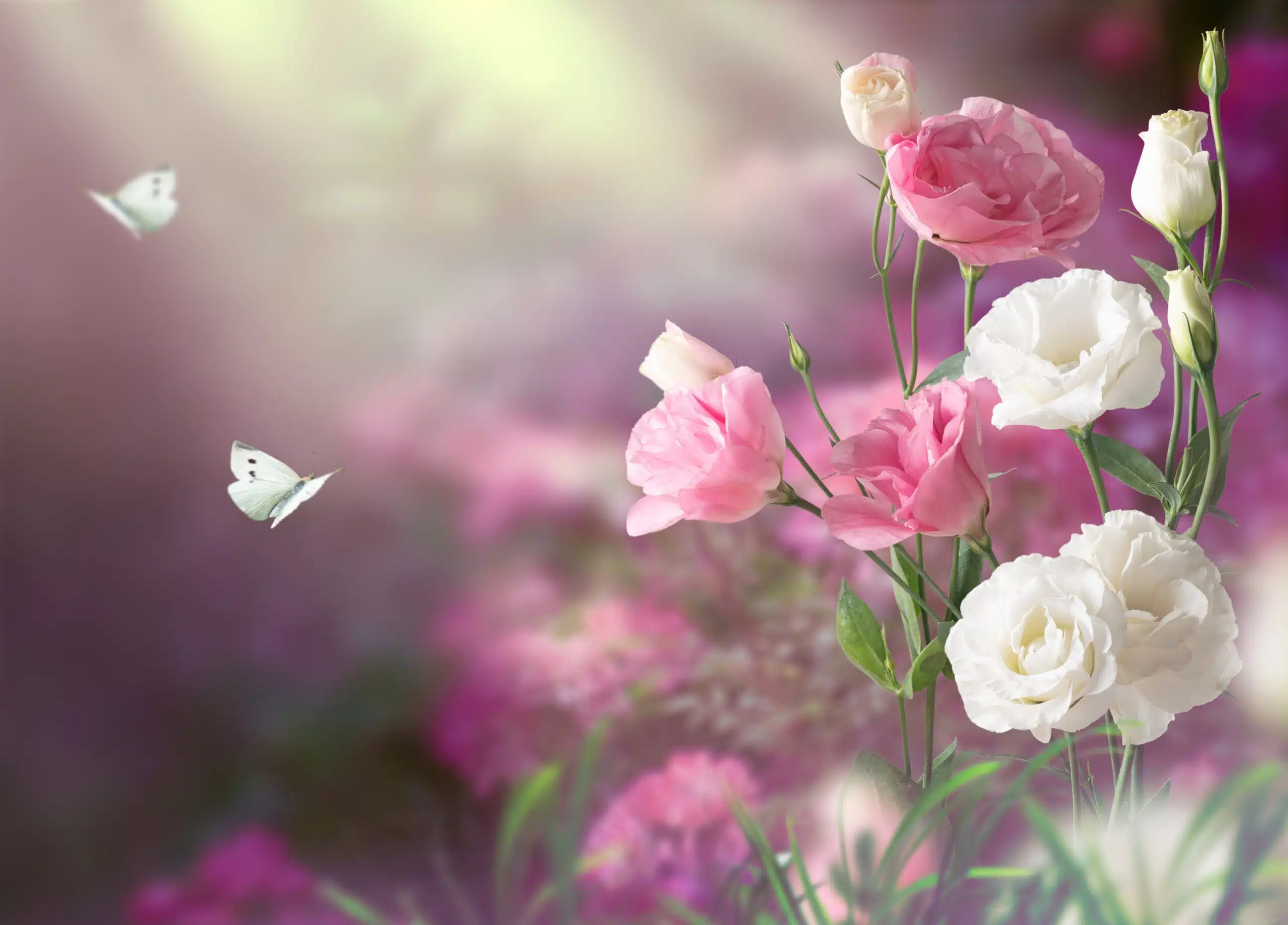
“Of Love: A Sonnet” by Robert Herrick
How love came in I do not know,
Whether by the eye, or ear, or no;
Or whether with the soul it came
(At first) infused with the same;
Whether in part ’tis here or there,
Or, like the soul, whole everywhere,
This troubles me: but I as well
As any other this can tell:
That when from hence she does depart
The outlet then is from the heart.
“Love Song” by Rainer Maria Rilke
When my soul touches yours a great chord sings!
How shall I tune it then to other things?
O! That some spot in darkness could be found
That does not vibrate when’er your depth sound.
But everything that touches you and me
Welds us as played strings sound one melody.
Where is the instrument whence the sounds flow?
And whose the master-hand that holds the bow?
O! Sweet song—
“Love” by William Shakespeare
Tell me where is fancy bred,
Or in the heart, or in the head?
How begot, how nourishèd?
Reply, reply.
It is engendered in the eyes,
With gazing fed; and fancy dies
In the cradle where it lies.
Let us all ring fancy’s knell;
I ’ll begin it,—ding, dong, bell,
Ding, dong, bell.

“Sonnet: Muses, That Sing Love’s Sensual Empirie” by George Chapman
Muses, that sing Love’s sensual empirie,
And lovers kindling your enragèd fires
At Cupid’s bonfires burning in the eye,
Blown with the empty breath of vain desires;
You, that prefer the painted cabinet
Before the wealthy jewels it doth store ye,
That all your joys in dying figures set,
And stain the living substance of your glory;
Abjure those joys, abhor their memory;
And let my love the honored subject be
Of love and honor’s complete history!
Your eyes were never yet let in to see
The majesty and riches of the mind,
That dwell in darkness; for your god is blind.
“Light” by Francis William Bourdillon
The night has a thousand eyes,
The day but one;
Yet the light of the bright world dies
With the dying sun.
The mind has a thousand eyes,
And the heart but one;
Yet the light of a whole life dies
When its love is done.
“Spring” by Meleager of Gadara (Andrew Lang, Translator)
Now the bright crocus flames, and now
The slim narcissus takes the rain,
And, straying o’er the mountain’s brow,
The daffodillies bud again.
The thousand blossoms wax and wane
On wold, and heath, and fragrant bough,
But fairer than the flowers art thou,
Than any growth of hill or plain.
Ye gardens, cast your leafy crown,
That my Love’s feet may tread it down,
Like lilies on the lilies set;
My Love, whose lips are softer far
Than drowsy poppy petals are,
And sweeter than the violets!
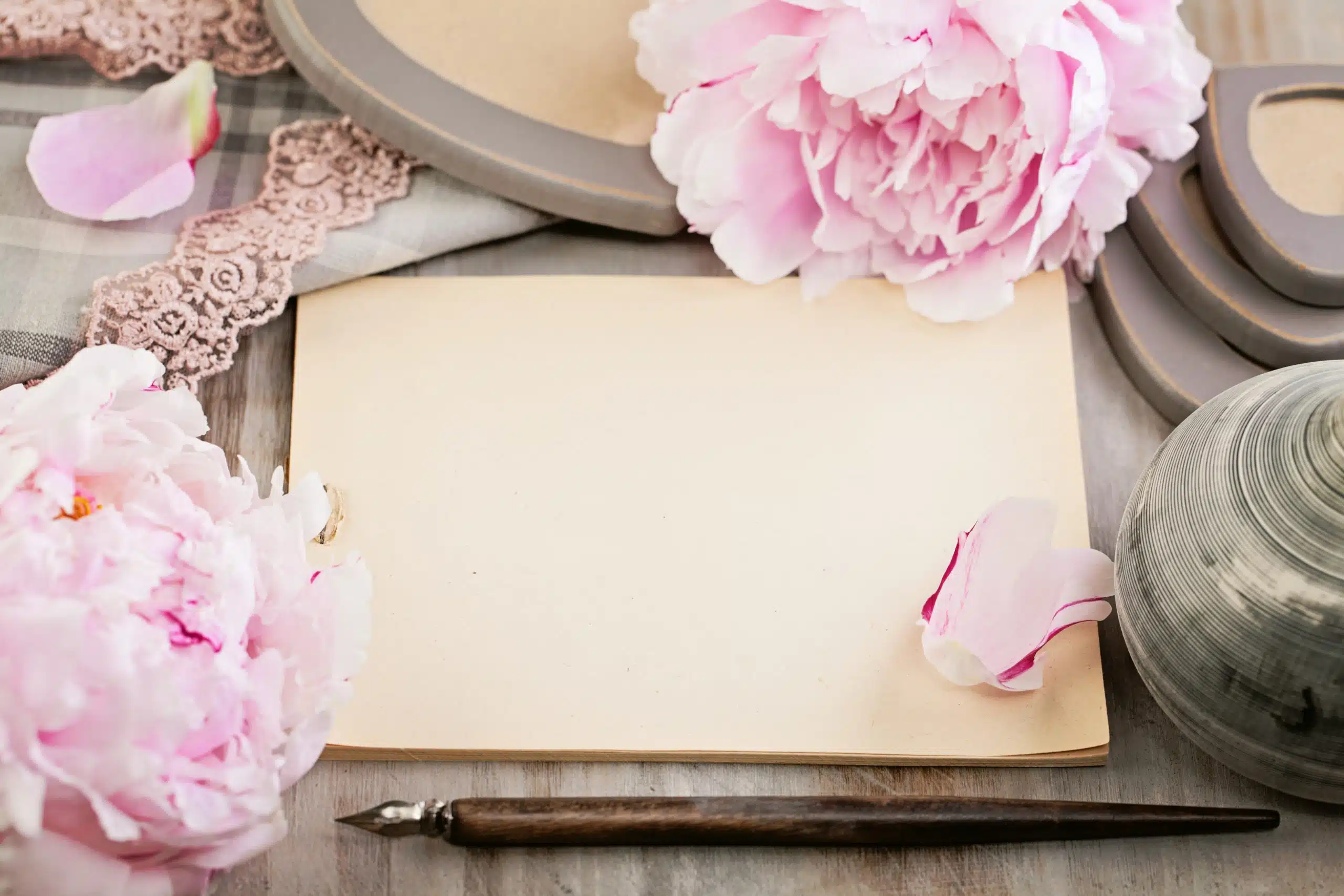
“A Poet To His Beloved” by William Butler Yeats
I bring you with reverent hands
The books of my numberless dreams,
White woman that passion has worn
As the tide wears the dove-grey sands,
And with heart more old than the horn
That is brimmed from the pale fire of time:
White woman with numberless dreams,
I bring you my passionate rhyme.
“Kate Temple’s Song” by Sir James Carnegie, Earl of Southesk
Only a touch, and nothing more:
Ah! but never so touched before!
Touch of lip, was it? Touch of hand?
Either is easy to understand.
Earth may be smitten with fire or frost—
Never the touch of true love lost.
Only a word, was it? Scarce a word!
Musical whisper, softly heard,
Syllabled nothing—just a breath—
’T will outlast life and ’t will laugh at death.
Love with so little can do so much—
Only a word, sweet! Only a touch!
“For Thee the Sun Doth Daily Rise, and Set” by George Santayana
For thee the sun doth daily rise, and set
Behind the curtain of the hills of sleep,
And my soul, passing through the nether deep,
Broods on thy love, and never can forget.
For thee the garlands of the wood are wet,
For thee the daisies up the meadow’s sweep
Stir in the sidelong light, and for thee weep
The drooping ferns above the violet.
For thee the labour of my studious ease
I ply with hope, for thee all pleasures please,
Thy sweetness doth the bread of sorrow leaven;
And from thy noble lips and heart of gold
I drink the comfort of the faiths of old,
Any thy perfection is my proof of heaven.
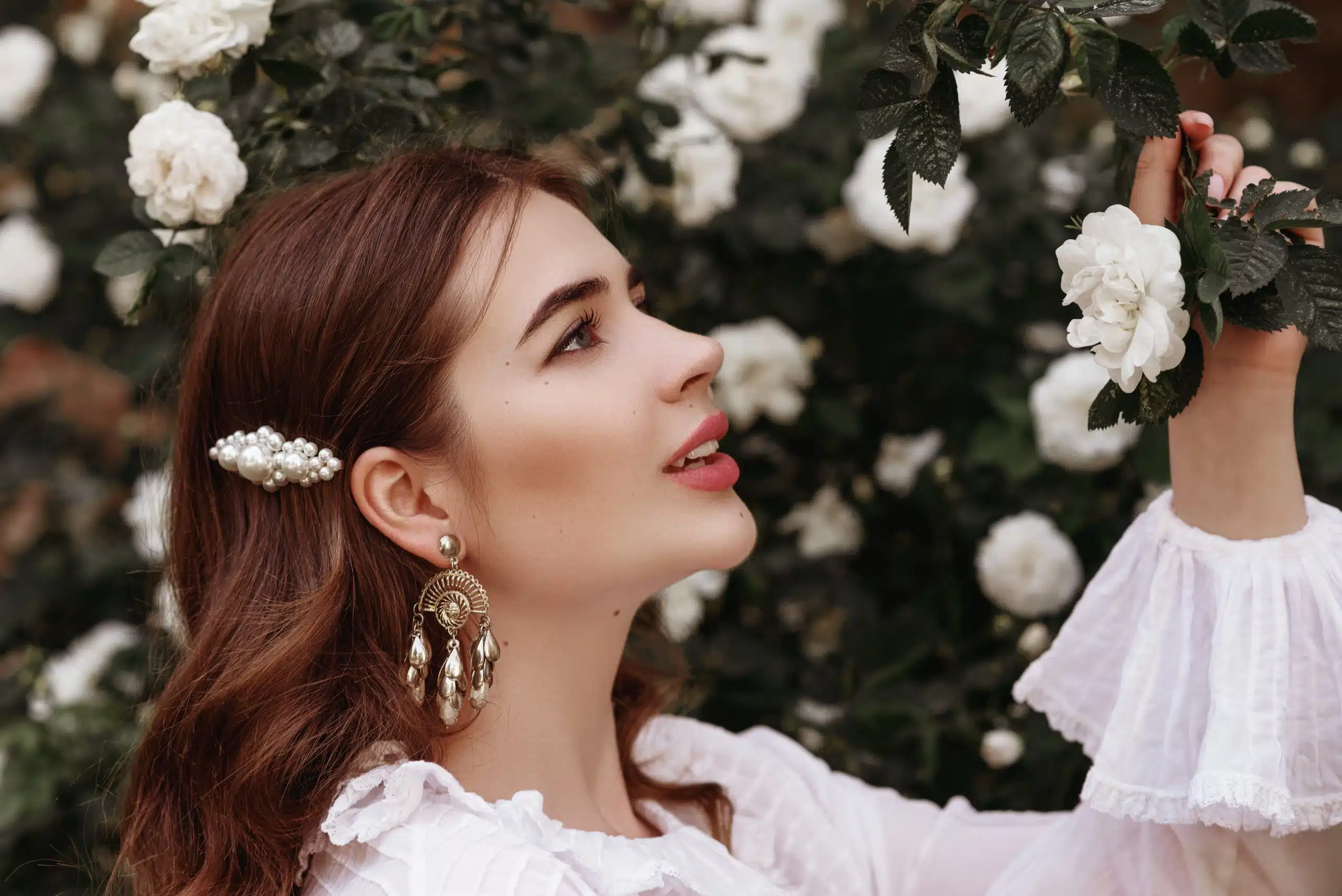
“The White Rose” by John Boyle O’Reilly
The red rose whispers of passion,
And the white rose breathes of love;
O, the red rose is a falcon,
And the white rose is a dove.
But I send you a cream-white rosebud
With a flush on its petal tips;
For the love that is purest and sweetest
Has a kiss of desire on the lips.
“O Mistress Mine” by William Shakespeare
O mistress mine, where are you roaming?
O, stay and hear! your true-love ’s coming
That can sing both high and low;
Trip no further, pretty sweeting,
Journeys end in lovers’ meeting,
Every wise man’s son doth know.
What is love? ’t is not hereafter;
Present mirth hath present laughter;
What ’s to come is still unsure:
In delay there lies no plenty,—
Then come kiss me, Sweet-and-twenty,
Youth ’s a stuff will not endure.
“Why?” by Mary Louise Ritter
Why came the rose? Because the sun, in shining,
Found in the mold some atoms rare and fine:
And, stooping, drew and warmed them into growing,—
Dust, with the spirit’s mystic countersign.
What made the perfume? All his wondrous kisses
Fell on the sweet red mouth, till, lost to sight,
The love became too exquisite, and vanished
Into a viewless rapture of the night.
Why did the rose die? Ah, why ask the question?
There is a time to love, a time to give;
She perished gladly, folding close the secret
Wherein is garnered what it is to live.
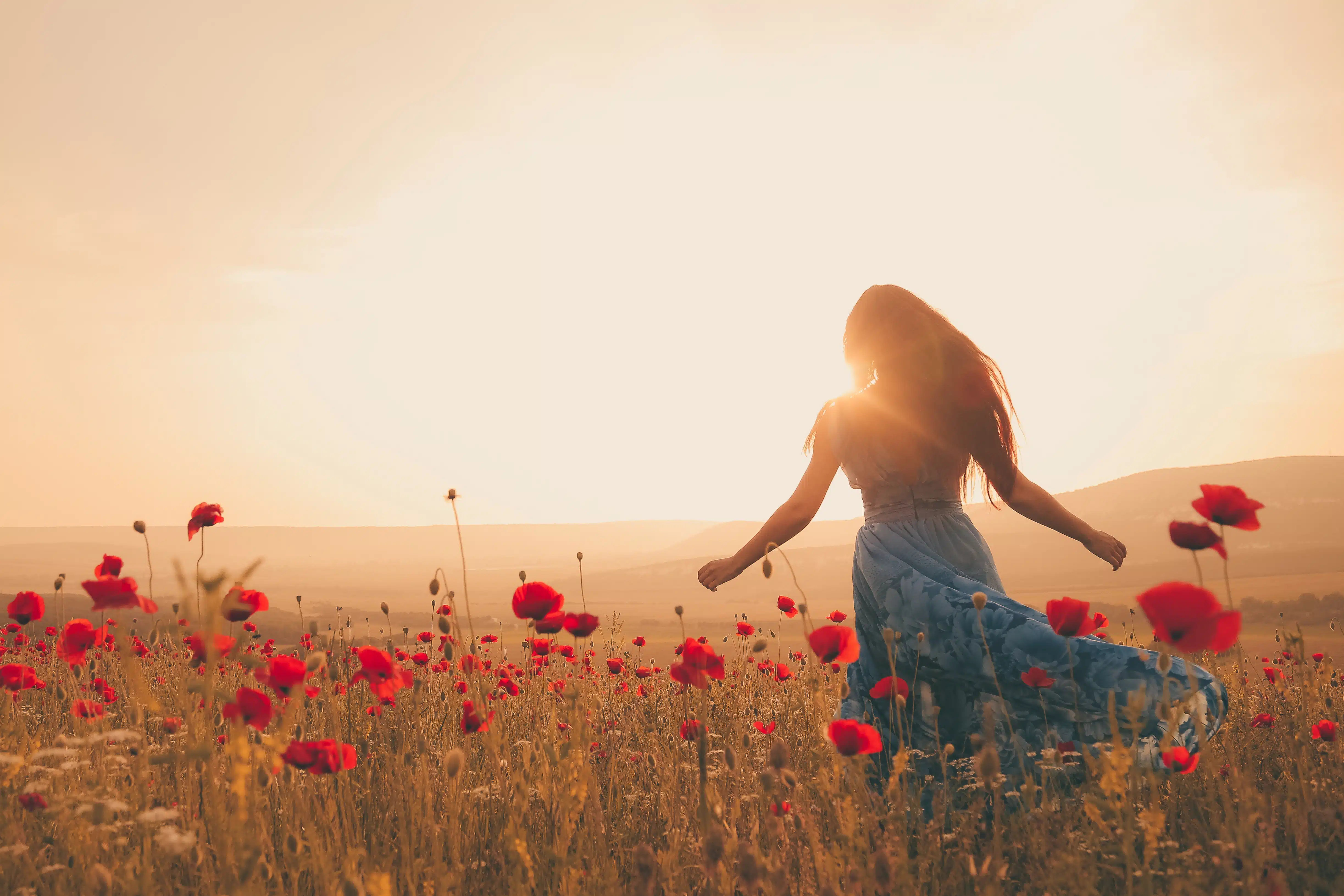
“Evening Song” by Willa Cather
Dear love, what thing of all the things that be
Is ever worth one thought from you or me,
Save only Love,
Save only Love?
The days so short, the nights so quick to flee,
The world so wide, so deep and dark the sea,
So dark the sea;
So far the suns and every listless star,
Beyond their light—Ah! dear, who knows how far,
Who knows how far?
One thing of all dim things I know is true,
The heart within me knows, and tells it you,
And tells it you.
So blind is life, so long at last is sleep,
And none but Love to bid us laugh or weep,
And none but Love,
And none but Love.
Romantic Poems For Her
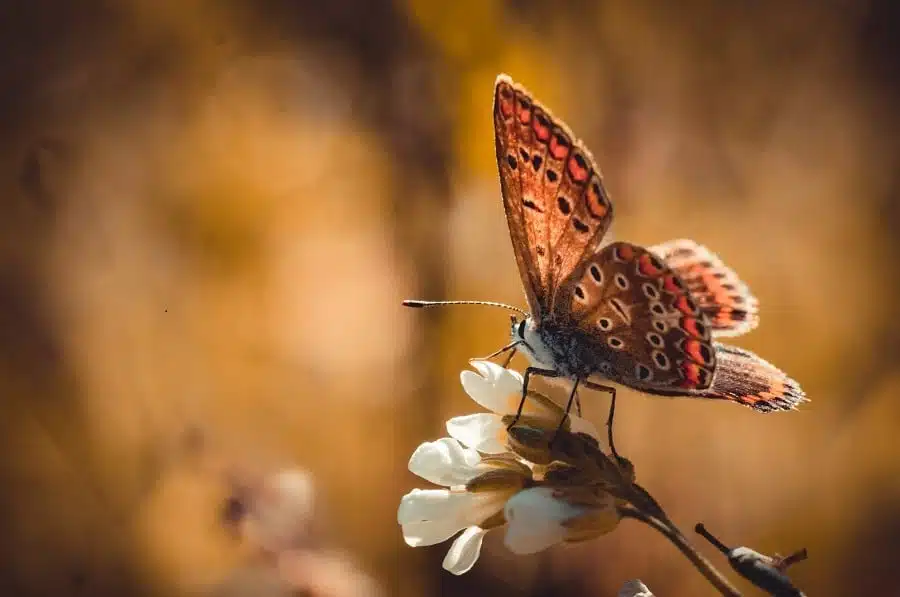
“The Lover’s Year” by George Parsons Lathrop
Thou art my morning, twilight, noon, and eve,
My Summer and my Winter, Spring and Fall;
For Nature left on thee a touch of all
The moods that come to gladden or to grieve
The heart of Time, with purpose to relieve
From lagging sameness. So do these forestall
In thee such o’erheaped sweetnesses as pall
Too swiftly, and the taster tasteless leave.
Scenes that I love, to me always remain
Beautiful, whether under summer’s sun
Beheld, or, storm-dark, stricken across with rain.
So, through all humors thou ’rt the same, sweet one:
Doubt not I love thee well in each, who see
Thy constant change is changeful constancy.
“Perfect Love” by Archibald Lampman
Beloved, those who moan of love’s brief day
Shall find but little grace with me, I guess,
Who know too well this passion’s tenderness
To deem that it shall lightly pass away,
A moment’s interlude in life’s dull play;
Though many loves have lingered to distress,
So shall not ours, sweet Lady, ne’ertheless,
But deepen with us till both heads be grey.
For perfect love is like a fair green plant,
That fades not with its blossoms, but lives on,
And gentle lovers shall not come to want,
Though fancy with its first mad dream be gone;
Sweet is the flower, whose radiant glory flies,
But sweeter still the green that never dies.
“My Love, Thou Art A Nosegay Sweet” by John Clare
My love, thou art a nosegay sweet,
My sweetest flower I’ll prove thee,
And pleased I pin thee to my breast,
And dearly do I love thee.
And when, my nosegay, thou shalt fade,
As sweet a flower thou’lt prove thee;
And as thou witherest on my breast
For beauty past I’ll love thee.
And when, my nosegay, thou shalt die,
And heaven’s flower shalt prove thee,
My hopes shall follow to the sky,
And everlasting love thee.

“Golden Eyes” by Rufinus (Andrew Lang, Translator)
Ah, Golden Eyes, to win you yet,
I bring mine April coronet,
The lovely blossoms of the spring,
For you I weave, to you I bring:
These roses with the lilies wet,
The dewy dark-eyed violet,
Narcissus, and the wind-flower wet.
Wilt thou disdain mine offering,
Ah, Golden Eyes?
Crowned with thy lover’s flowers, forget
The pride wherein thy heart is set,
For thou, like these or anything,
Hast but thine hour of blossoming,
Thy spring, and then—the long regret,
Ah, Golden Eyes!
“The Awakening” by James Weldon Johnson
I dreamed that I was a rose
That grew beside a lonely way,
Close by a path none ever chose,
And there I lingered day by day.
Beneath the sunshine and the show’r
I grew and waited there apart,
Gathering perfume hour by hour,
And storing it within my heart,
Yet, never knew,
Just why I waited there and grew.
I dreamed that you were a bee
That one day gaily flew along,
You came across the hedge to me,
And sang a soft, love-burdened song.
You brushed my petals with a kiss,
I woke to gladness with a start,
And yielded up to you in bliss
The treasured fragrance of my heart;
And then I knew
That I had waited there for you.
“To Helen” by Edgar Allan Poe
Helen, thy beauty is to me
Like those Nicæan barks of yore,
That gently, o’er a perfumed sea,
The weary, wayworn wanderer bore
To his own native shore.
On desperate seas long wont to roam,
Thy hyacinth hair, thy classic face,
Thy Naiad airs, have brought me home
To the glory that was Greece
And the grandeur that was Rome.
Lo! in yon brilliant window-niche
How statue-like I see thee stand,
The agate lamp within thy hand!
Ah, Psyche, from the regions which
Are Holy Land!
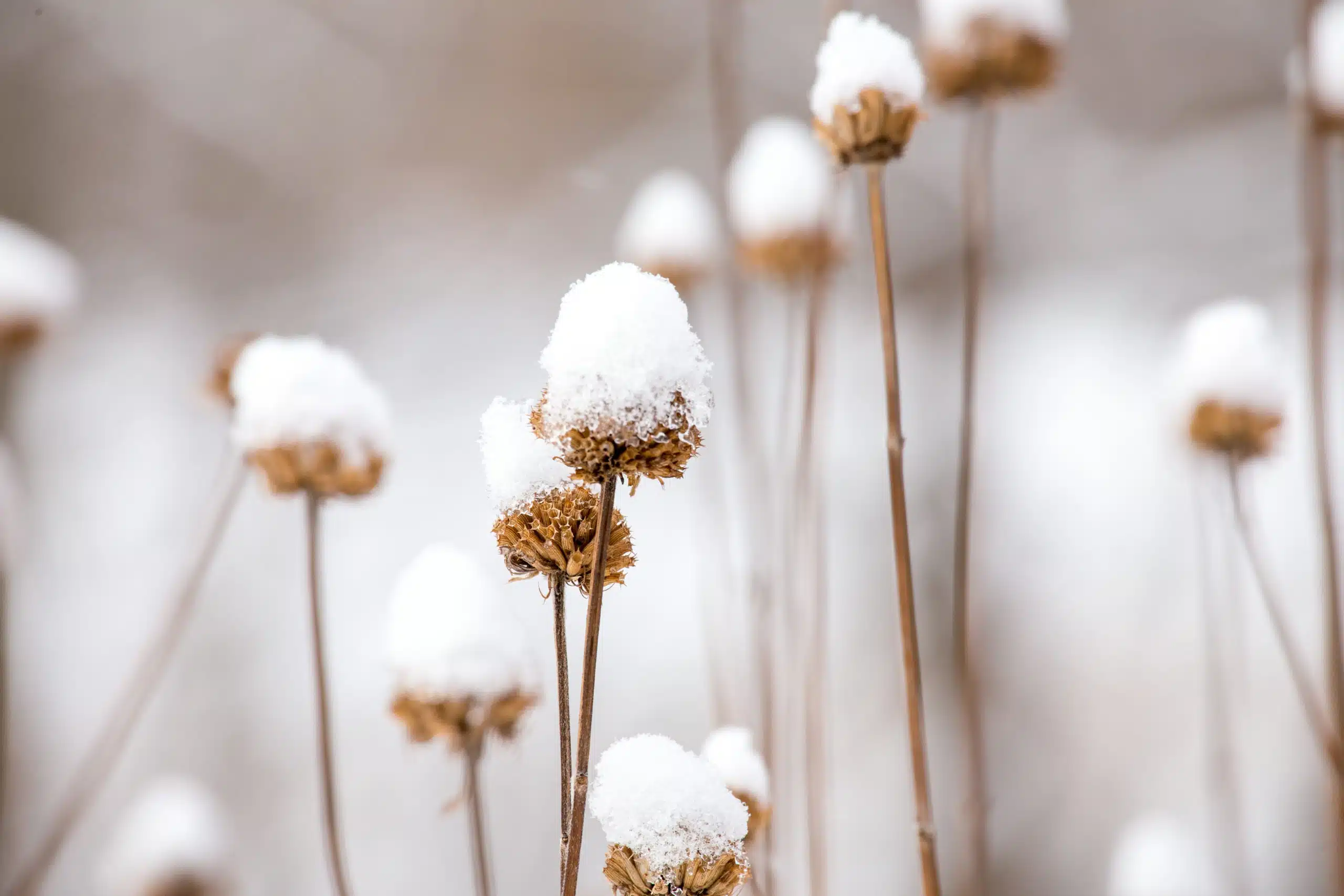
“Thou Art To Me” by Arthur Macy
Thou art to me
As are soft breezes to a summer sea;
As stars unto the night;
Or when the day is born,
As sunrise to the morn;
As peace unto the fading of the light.
Thou art to me
As one sweet flower upon a barren lea;
As rest to toiling hands;
As one clear spring amid the desert sands;
As smiles to maidens’ lips;
As hope to friends that wait for absent ships;
As happiness to youth;
As purity to truth;
As sweetest dreams to sleep;
As balm to wounded hearts that weep.
All, all that I would have thee be
Thou art to me.
“Welcome, Welcome, Do I Sing” by William Browne
Welcome, welcome, do I sing,
Far more welcome than the spring;
He that parteth from you never
Shall enjoy a spring forever.
Love, that to the voice is near,
Breaking from your ivory pale,
Need not walk abroad to hear
The delightful nightingale.
Welcome, welcome, then I sing, etc.
Love, that still looks on your eyes
Though the winter have begun
To benumb our arteries,
Shall not want the summer’s sun.
Welcome, welcome, then I sing, etc.
Love, that still may see your cheeks,
Where all rareness still reposes,
Is a fool if e’er he seeks
Other lilies, other roses.
Welcome, welcome, then I sing, etc.
Love, to whom your soft lip yields,
And perceives your breath in kissing,
All the odors of the fields
Never, never shall be missing.
“A Sonnet” by Fannie Isabelle Sherrick
Sweet summer queen, with trailing robe of green,
What spell has thou to bind the heart to thee?
Thy throne is built upon the sun-lit sea,
Where break the waves in clouds of silver sheen
And oft at dawn like some resplendent queen,
Thou sittest on the hills in majesty;
And all the flowers wake at thy decree.
But now farewell to all thy joys serene;
The autumn comes with swift-winged, silent flight,
And he will woo thee with his fiery breath;
In crimson robes and hues of flashing gold
He’ll clothe thee, and thy beauty in the night
Will take a richer glow. But wintry death
Will come and wrap thee in his fold.

“The Flower of Love (From Melincourt)” by Thomas Love Peacock
’Tis said the rose is Love’s own flower,
Its blush so bright, its thorns so many;
And winter on its bloom has power,
But has not on its sweetness any.
For though young Love’s ethereal rose
Will droop on Age’s wintry bosom,
Yet still its faded leaves disclose
The fragrance of their earliest blossom.
But ah! the fragrance lingering there
Is like the sweets that mournful duty
Bestows with sadly-soothing care,
To deck the grave of bloom and beauty.
For when its leaves are shrunk and dry,
Its blush extinct, to kindle never,
That fragrance is but Memory’s sigh,
That breathes of pleasures past for ever.
Why did not Love the amaranth choose,
That bears no thorns, and cannot perish?
Alas! no sweets its flowers diffuse,
And only sweets Love’s life can cherish.
But be the rose and amaranth twined,
And Love, their mingled powers assuming,
Shall round his brows a chaplet bind,
For ever sweet, for ever blooming.
“Disdain Me Not” by Thomas Wyatt
Disdain me not without desert,
Nor leave me not so suddenly;
Since well ye wot that in my heart
I mean ye not but honestly.
Disdain me not.
Refuse me not without cause why,
Nor think me not to be unjust;
Since that by lot of fantasy
This careful knot needs knit I must.
Refuse me not.
Mistrust me not, though some there be
That fain would spot my steadfastness;
Believe them not, since that we see
The proof is not as they express.
Mistrust me not.
Forsake me not till I deserve
Nor hate me not till I offend;
Destroy me not till that I swerve;
But since ye know that I intend,
Forsake me not.
Disdain me not that I’m your own:
Refuse me not that I’m so true:
Mistrust me not till all be known:
Forsake me not ne for no new.
Disdain me not.
“Love’s Growth” by John Donne
I scarce believe my love to be so pure
As I had thought it was,
Because it doth endure
Vicissitude, and season, as the grass ;
Methinks I lied all winter, when I swore
My love was infinite, if spring make it more.
But if this medicine, love, which cures all sorrow
With more, not only be no quintessence,
But mix’d of all stuffs, vexing soul, or sense,
And of the sun his active vigour borrow,
Love’s not so pure, and abstract as they use
To say, which have no mistress but their Muse ;
But as all else, being elemented too,
Love sometimes would contemplate, sometimes do.
And yet no greater, but more eminent,
Love by the spring is grown ;
As in the firmament
Stars by the sun are not enlarged, but shown,
Gentle love deeds, as blossoms on a bough,
From love’s awakened root do bud out now.
If, as in water stirr’d more circles be
Produced by one, love such additions take,
Those like so many spheres but one heaven make,
For they are all concentric unto thee ;
And though each spring do add to love new heat,
As princes do in times of action get
New taxes, and remit them not in peace,
No winter shall abate this spring’s increase.

“The Definition Of Love” by Andrew Marvell
My Love is of a birth as rare
As ’tis for object strange and high:
It was begotten by despair
Upon Impossibility.
Magnanimous Despair alone.
Could show me so divine a thing,
Where feeble Hope could ne’r have flown
But vainly flapt its Tinsel Wing.
And yet I quickly might arrive
Where my extended Soul is fixt,
But Fate does Iron wedges drive,
And alwaies crouds it self betwixt.
For Fate with jealous Eye does see.
Two perfect Loves; nor lets them close:
Their union would her ruine be,
And her Tyrannick pow’r depose.
And therefore her Decrees of Steel
Us as the distant Poles have plac’d,
(Though Loves whole World on us doth wheel)
Not by themselves to be embrac’d.
Unless the giddy Heaven fall,
And Earth some new Convulsion tear;
And, us to joyn, the World should all
Be cramp’d into a Planisphere.
As Lines so Loves Oblique may well
Themselves in every Angle greet:
But ours so truly Paralel,
Though infinite can never meet.
Therefore the Love which us doth bind,
But Fate so enviously debarrs,
Is the Conjunction of the Mind,
And Opposition of the Stars.
“Extinguish My Eyes” by Rainer Maria Rilke
Extinguish my eyes, I still can see you,
Close my ears, I can hear your footsteps fall,
And without feet I still can follow you,
And without voice I still can to you call.
Break off my arms, and I can embrace you,
Enfold you with my heart as with a hand.
Hold my heart, my brain will take fire of you
As flax ignites from a lit fire-brand—
And flame will sweep in a swift rushing flood
Through all the singing currents of my blood.
“Vision of a Fair Woman” from Elizabeth A. Sharp’s “Lyra Celtica”
Tell us some of the charms of the stars:
Close and well set were her ivory teeth;
White as the canna upon the moor
Was her bosom the tartan bright beneath.
Her well-rounded forehead shone
Soft and fair as the mountain snow;
Her two breasts were heaving full;
To them did the hearts of heroes flow.
Her lips were ruddier than the rose;
Tender and tunefully sweet her tongue;
White as the foam adown her side
Her delicate fingers extended hung.
Smooth as the dusky down of the elk
Appeared her shady eyebrows to me;
Lovely her cheeks were, like berries red;
From every guile she was wholly free.
Her countenance looked like the gentle buds
Unfolding their beauty in early spring;
Her yellow locks like the gold-browed hills;
And her eyes like the radiance the sunbeams bring.
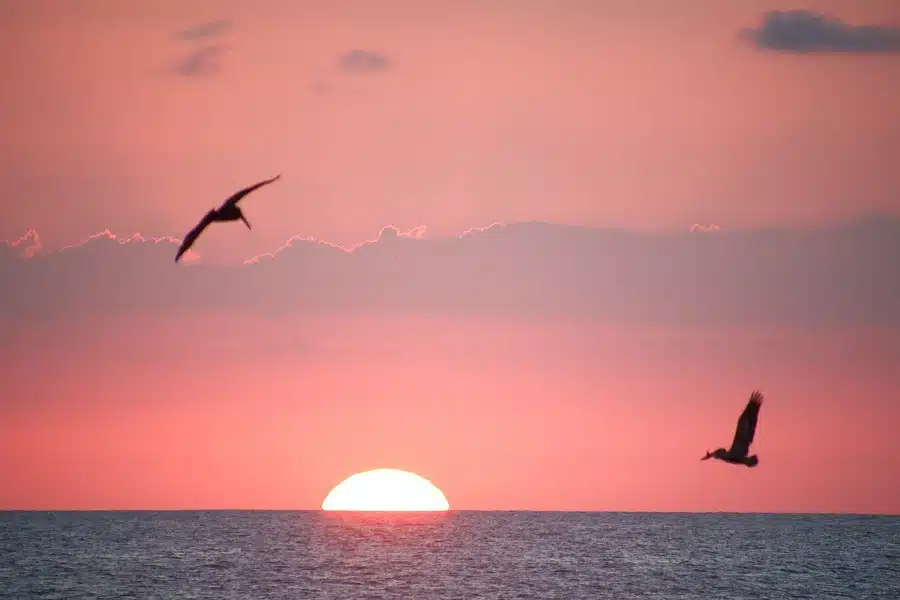
“Beyond the Sea” by Thomas Love Peacock
Beyond the sea, beyond the sea,
My heart is gone, far, far from me;
And ever on its track will flee
My thoughts, my dreams, beyond the sea.
Beyond the sea, beyond the sea,
The swallow wanders fast and free:
Oh, happy bird! were I like thee,
I, too, would fly beyond the sea.
Beyond the sea, beyond the sea,
Are kindly hearts and social glee:
But here for me they may not be;
My heart is gone beyond the sea.
“When Like An Eaglet” by Michael Drayton
When like an eaglet I first found my Love,
For that the virtue I thereof would know,
Upon the nest I set it forth to prove
If it were of that kingly kind or no;
But it no sooner say my Sun appear,
But on her rays with open eyes it stood,
To show that I had hatch’d it for the air
And rightly came from that brave mounting brood;
And, when the plumes were summ’d with sweet desire,
To prove the pinions it ascends the skies;
Do what I could, it needsly would aspire
To my Soul’s Sun, those two celestial eyes.
Thus from my breast, where it was bred alone,
It after thee is, like an eaglet, flown.
“Beauty That Is Never Old” by James Weldon Johnson
When buffeted and beaten by life’s storms,
When by the bitter cares of life oppressed,
I want no surer haven than your arms,
I want no sweeter heaven than your breast.
When over my life’s way there falls the blight
Of sunless days, and nights of starless skies;
Enough for me, the calm and steadfast light
That softly shines within your loving eyes.
The world, for me, and all the world can hold
Is circled by your arms; for me there lies,
Within the lights and shadows of your eyes,
The only beauty that is never old.
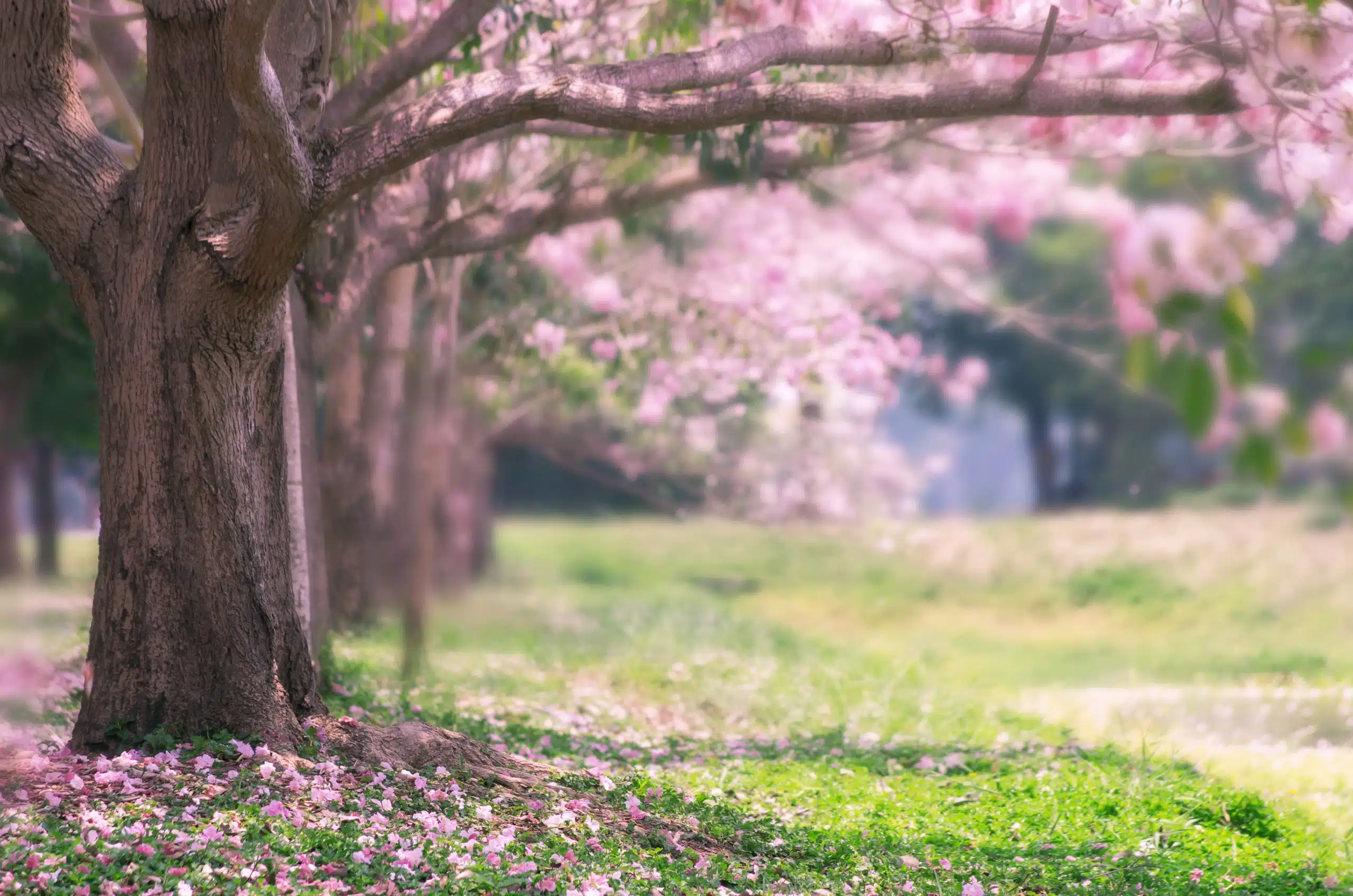
“My Lady Is Compared To A Young Tree” by Vachel Lindsay
When I see a young tree
In its white beginning,
With white leaves
And white buds
Barely tipped with green,
In the April weather,
In the weeping sunshine—
Then I see my lady,
My democratic queen,
Standing free and equal
With the youngest woodland sapling
Swaying, singing in the wind,
Delicate and white:
Soul so near to blossom,
Fragile, strong as death;
A kiss from far-off Eden,
A flash of Judgment’s trumpet—
April’s breath.
“Bright Star Of Beauty” by Michael Drayton
Bright star of beauty, on whose eyelids sit
A thousand nymph-like and enamour’d Graces,
The Goddesses of Memory and Wit,
Which there in order take their several places;
In whose dear bosom sweet delicious Love
Lays down his quiver, which he once did bear,
Since he that blessed Paradise did prove,
And leaves his mother’s lap to sport him there.
Let others strive to entertain with words;
My soul is of a braver metal made;
I hold that vile which vulgar wit affords;
In me’s that faith which Time cannot invade.
Let what I praise be still made good by you;
Be you most worthy, whilst I am most true.
“Love-Lily” by Dante Gabriel Rossetti
Between the hands, between the brows,
Between the lips of Love-Lily,
A spirit is born whose birth endows
My blood with fire to burn through me;
Who breathes upon my gazing eyes,
Who laughs and murmurs in mine ear,
At whose least touch my colour flies,
And whom my life grows faint to hear.
Within the voice, within the heart,
Within the mind of Love-Lily,
A spirit is born who lifts apart
His tremulous wings and looks at me;
Who on my mouth his finger lays,
And shows, while whispering lutes confer,
That Eden of Love’s watered ways
Whose winds and spirits worship her.
Brows, hands, and lips, heart, mind, and voice,
Kisses and words of Love-Lily,—
Oh! bid me with your joy rejoice
Till riotous longing rest in me!
Ah! let not hope be still distraught,
But find in her its gracious goal,
Whose speech Truth knows not from her thought
Nor Love her body from her soul.
Long Love Poems For Her
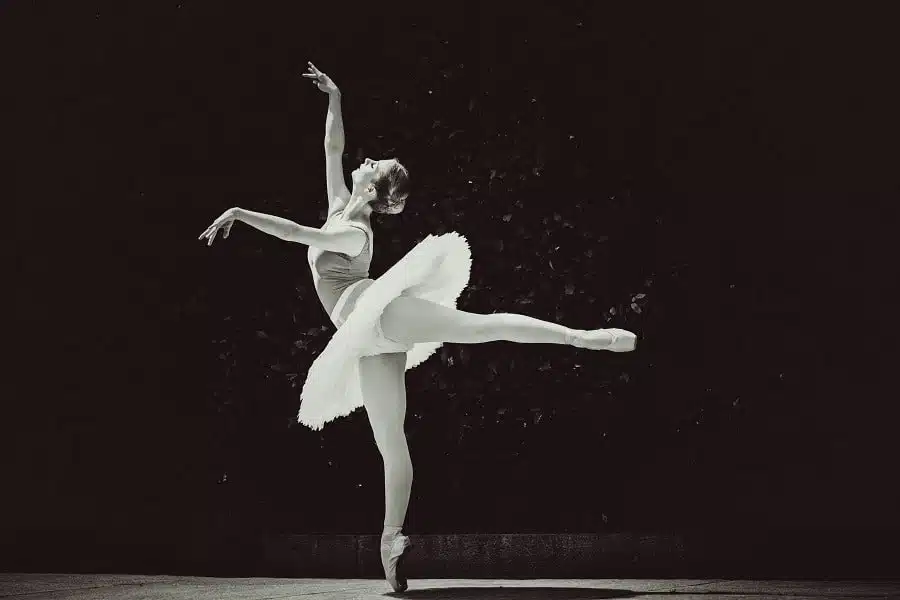
“Immortal Love” by George Edward Woodberry
Immortal love, too high for my possessing,—
Yet, lower than thee, where shall I find repose?
Long in my youth I sang the morning rose,
By earthly things the heavenly pattern guessing!
Long fared I on, beauty and love caressing,
And finding in my heart a place for those
Eternal fugitives; the golden close
Of evening folds me, still their sweetness blessing.
Oh happy we, the first-born heirs of nature,
For whom the Heavenly Sun delays his light!
He by the sweets of every mortal creature
Tempers eternal beauty to our sight;
And by the glow upon love’s earthly feature
Maketh the path of our departure bright.
“August Moonlight” by Richard Le Gallienne
The solemn light behind the barns,
The rising moon, the cricket’s call,
The August night, and you and I—
What is the meaning of it all!
Has it a meaning, after all?
Or is it one of Nature’s lies,
That net of beauty that she casts
Over Life’s unsuspecting eyes?
That web of beauty that she weaves
For one strange purpose of her own,—
For this the painted butterfly,
For this the rose—for this alone!
Strange repetition of the rose,
And strange reiterated call
Of bird and insect, man and maid,—
Is that the meaning of it all?
If it means nothing after all!
And nothing lives except to die—
It is enough—that solemn light
Behind the barns, and you and I.
“Meeting At Night” by Robert Browning
I
The grey sea and the long black land;
And the yellow half-moon large and low;
And the startled little waves that leap
In fiery ringlets from their sleep,
As I gain the cove with pushing prow,
And quench its speed i’ the slushy sand.
II
Then a mile of warm sea-scented beach;
Three fields to cross till a farm appears;
A tap at the pane, the quick sharp scratch
And blue spurt of a lighted match,
And a voice less loud, thro’ its joys and fears,
Than the two hearts beating each to each!

“My Queen” by Fannie Isabelle Sherrick
A fair sweet blossom is born for you,
A beautiful rose, my queen!
And never was flower so fair as this,
Oh, never so fair, I ween!
A banner is hung in the western sky
Of colors that flash ere they fade and die;
And the rippling waves where the waters run
Are stained with the gold of the summer sun;
The world is so fair for you, my queen,
The world is so fair and true;
And the rose that blossoms to-day, my own,
Is the love that I have for you.
The grasses that spring at your feet, my queen,
Could whisper all day in your ear;
But I stand dumb at your side, my own,
Stilled by my love’s own fear.
Oh, what would you know of my love’s sweet will
The heart speaks most when the lips are still;
And the love that is filling my soul to-day
Is the beautiful blossom you throw away.
But I worship you still, my queen, my queen,
I worship you still, I ween;
For the loveliest blossom on earth I know
Is my beautiful love, my queen!
“Winter to Spring” by Irvin W. Underhill
Did not I remember that my hair is grey
With only a fringe of it left,
I’d follow your footsteps from wee break of day
Till night was of moon-light bereft.
Your eyes wondrous fountains of joy and of youth
Remind me of days long since flown,
My sweetheart, I led to the altar of truth,
But then the gay spring was my own.
Now winter has come with its snow and its wind
And made me as bare as its trees,
Oh, yes, I still love, but it’s only in mind,
For I’m fast growing weak at the knees.
Your voice is as sweet as the song of a bird,
Your manners are those of the fawn,
I dream of you, darling,—oh, pardon, that word,
From twilight to breaking of dawn.
Your name in this missive you’ll search for in vain,
Nor mine at the finis, I’ll fling,
For winter must suffer the bliss and the pain
In secret for loving the spring.
“Poet to His Love” by Maxwell Bodenheim
An old silver church in a forest
Is my love for you.
The trees around it
Are words that I have stolen from your heart.
An old silver bell, the last smile you gave,
Hangs at the top of my church.
It rings only when you come through the forest
And stand beside it.
And then, it has no need for ringing,
For your voice takes its place.

“As Long As Your Eyes Are Blue” by Banjo Paterson (Andrew Barton)
“Will you love me, sweet, when my hair is grey
And my cheeks shall have lost their hue?
When the charms of youth shall have passed away
Will your love as of old prove true?
“For the looks may change, and the heart may range
And the love be no longer fond;
Will you love with truth in the years of youth
And away to the years beyond?”
Oh, I love you, sweet, for your locks of brown
And the blush on your cheek that lies,
But I love you most for the kindly heart
That I see in your sweet blue eyes.
For the eyes are the signs of the soul within,
Of the heart that is leal and true,
And, my own sweetheart, I shall love you still,
Just as long as your eyes are blue.
For the locks may bleach, and the cheeks of peach
May be reft of their golden hue;
But, my own sweetheart, I shall love you still,
Just as long as your eyes are blue.
“A Red, Red Rose” by Robert Burns
O my Luve’s like a red, red rose
That’s newly sprung in June:
O my Luve’s like the melodie
That’s sweetly play’d in tune!
As fair thou art, my bonnie lass,
So deep in love am I:
And I will love thee still, my dear,
Till a’ the seas gang dry:
Till a’ the seas gang dry, my dear,
And the rocks melt with the sun;
I will luve thee still my dear,
When the sands of life shall run.
And fare thee weel, my only Luve,
And fare thee weel a while!
And I will come again , my Luve,
Tho’ it were ten thousand mile.
“Spring Reminiscence” by Countee Cullen
“My sweet,” you sang, and, “Sweet,” I sang,
And sweet we sang together,
Glad to be young as the world was young,
Two colts too strong for a tether.
Shall ever a spring be like that spring,
Or apple blossoms as white;
Or ever clover smell like the clover
We lay upon that night?
Shall ever your hand lie in my hand,
Pulsing to it, I wonder;
Or have the gods, being jealous gods,
Envied us our thunder?

“Longing” by Matthew Arnold
Come to me in my dreams, and then
By day I shall be well again!
For so the night will more than pay
The hopeless longing of the day.
Come, as thou cam’st a thousand times,
A messenger from radiant climes,
And smile on thy new world, and be
As kind to others as to me!
Or, as thou never cam’st in sooth,
Come now, and let me dream it truth,
And part my hair, and kiss my brow,
And say, My love why sufferest thou?
Come to me in my dreams, and then
By day I shall be well again!
For so the night will more than pay
The hopeless longing of the day.
“The Flower Of Love” by Thomas Love Peacock
‘Tis said the rose is Love’s own flower,
Its blush so bright, its thorns so many;
And winter on its bloom has power,
But has not on its sweetness any.
For though young Love’s ethereal rose
Will droop on Age’s wintry bosom,
Yet still its faded leaves disclose
The fragrance of their earliest blossom.
But ah! the fragrance lingering there
Is like the sweets that mournful duty
Bestows with sadly-soothing care,
To deck the grave of bloom and beauty.
For when its leaves are shrunk and dry,
Its blush extinct, to kindle never,
That fragrance is but Memory’s sigh,
That breathes of pleasures past for ever.
Why did not Love the amaranth choose,
That bears no thorns, and cannot perish ?
Alas! no sweets its flowers diffuse,
And only sweets Love’s life can cherish.
But be the rose and amaranth twined,
And Love, their mingled powers assuming,
Shall round his brows a chaplet bind,
For ever sweet, for ever blooming.
“Oh, for a Little While Be Kind” by Countee Cullen
Oh, for a little while be kind to me
Who stand in such imperious need of
you,
And for a fitful space let my head lie
Happily on your passion’s frigid breast.
Although yourself no more resigned to me
Than on all bitter yesterdays I knew,
This half a loaf from sumptuous crumbs
your shy
Reneging hand lets fall shall make me blest.
The sturdy homage of a love that throws
Its strength about you, dawn and dusk, at bed
And board, is not for scorn. When all is said
With final amen certitude, who knows
But Dives found a matchless fragrance fled
When Lazarus no longer shocked his nose?
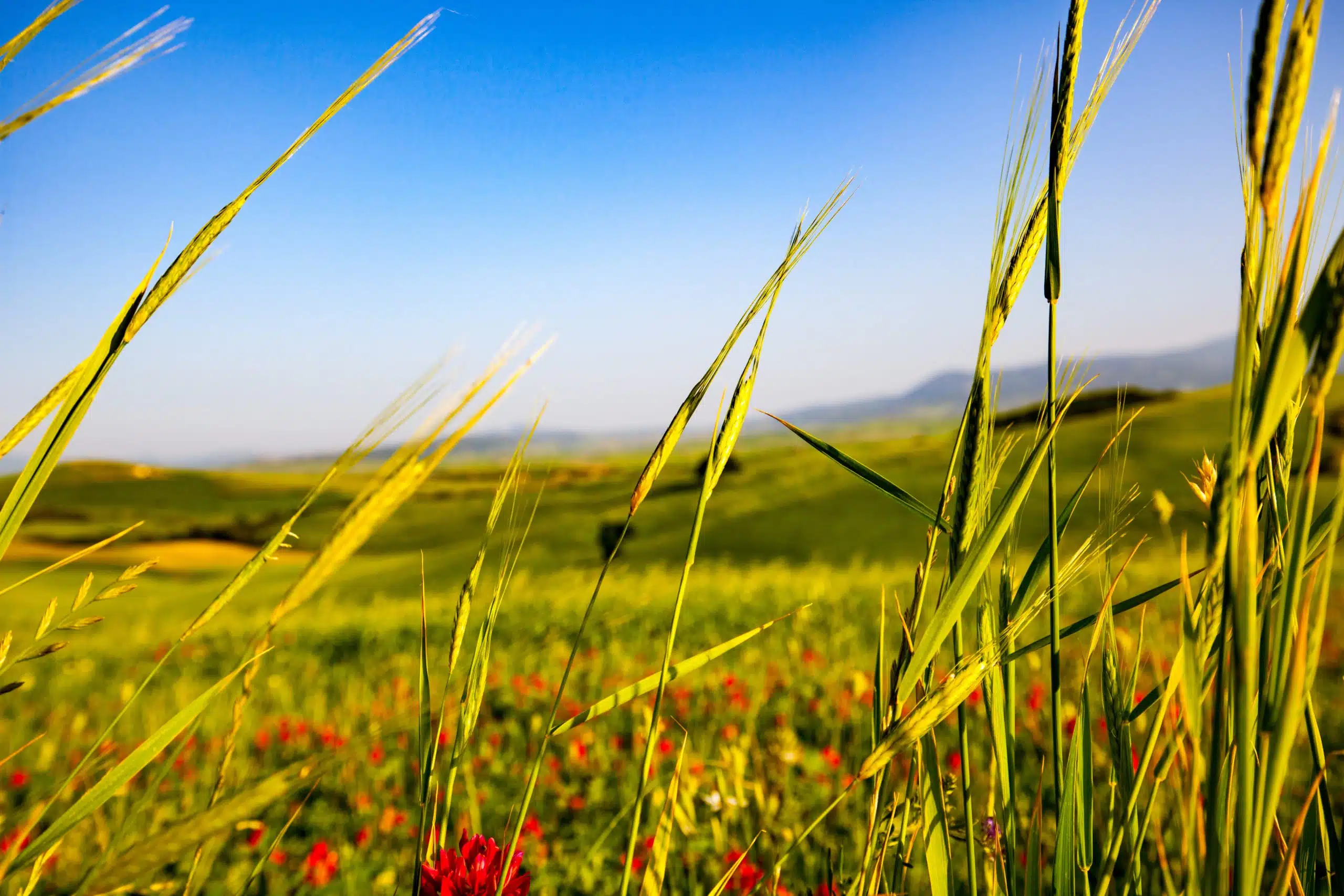
“Meet Me In The Green Glen” by John Clare
Love, meet me in the green glen,
Beside the tall elm-tree,
Where the sweetbriar smells so sweet agen;
There come with me.
Meet me in the green glen.
Meet me at the sunset
Down in the green glen,
Where we’ve often met
By hawthorn-tree and foxes’ den,
Meet me in the green glen.
Meet me in the green glen,
By sweetbriar bushes there;
Meet me by your own sen,
Where the wild thyme blossoms fair.
Meet me in the green glen.
Meet me by the sweetbriar,
By the mole-hill swelling there;
When the west glows like a fire
God’s crimson bed is there.
Meet me in the green glen.
“A Match” by Algernon Charles Swinburne
If love were what the rose is,
And I were like the leaf,
Our lives would grow together
In sad or singing weather,
Blown fields or flowerful closes,
Green pleasure or gray grief;
If love were what the rose is,
And I were like the leaf.
If I were what the words are,
And love were like the tune,
With double sound and single
Delight our lips would mingle,
With kisses glad as birds are
That get sweet rain at noon;
If I were what the words are
And love were like the tune .
If you were life, my darling,
And I your love were death,
We’d shine and snow together
Ere March made sweet the weather
With daffodil and starling
And hours of fruitful breath;
If you were life, my darling,
And I your love were death.
If you were thrall to sorrow,
And I were page to joy,
We’d play for lives and seasons
With loving looks and treasons
And tears of night and morrow
And laughs of maid and boy;
If you were thrall to sorrow,
And I were page to joy.
If you were April’s lady,
And I were lord in May,
We’d throw with leaves for hours
And draw for days with flowers,
Till day like night were shady
And night were bright like day;
If you were April’s lady,
And I were lord in May.
If you were queen of pleasure,
And I were king of pain,
We’d hunt down love together,
Pluck out his flying feather,
And- teach his feet a measure,
And find his mouth a rein;
If you were queen of pleasure,
And I were king of pain.
“The Morning Of Love” by Thomas Love Peacock
O! The spring-time of life is the season of blooming,
And the morning of love is the season of joy;
Ere noontide and summer, with radiance consuming,
Look down on their beauty, to parch and destroy.
0! faint are the blossoms life’s pathway adorning,
When the first magic glory of hope is withdrawn;
For the flowers of the spring, and the light of the morning,
Have no summer budding, and no second dawn.
Through meadows all sunshine, and verdure, and flowers
The stream of the valley in purity flies;
But mixed with the tides, where some proud city lowers,
O! where is the sweetness that dwelt on its rise ?
The rose withers fast-on the breast it first graces;
Its beauty is fled ere the day be half done:—
And life is that stream which its progress defaces,
And love is that flower which can bloom but for one.
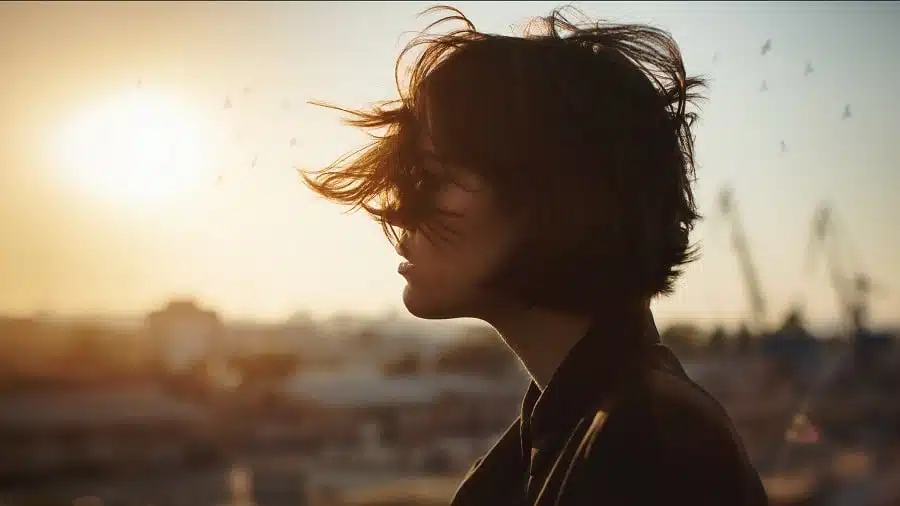
“Spring Night” by Sara Teasdale
The park is filled with night and fog,
The veils are drawn about the world,
The drowsy lights along the paths
Are dim and pearled.
Gold and gleaming the empty streets,
Gold and gleaming the misty lake,
The mirrored lights like sunken swords,
Glimmer and shake.
Oh, is it not enough to be
Here with this beauty over me?
My throat should ache with praise, and I
Should kneel in joy beneath the sky.
O beauty, are you not enough?
Why am I crying after love,
With youth, a singing voice, and eyes
To take earth’s wonder with surprise?
Why have I put off my pride,
Why am I unsatisfied,—
I, for whom the pensive night
Binds her cloudy hair with light,—
I, for whom all beauty burns
Like incense in a million urns?
O beauty, are you not enough?
Why am I crying after love?
“My Fair, If Thou Wilt” by Michael Drayton
My Fair, if thou wilt register my love,
A world of volumes shall thereof arise;
Preserve my tears, and thou thyself shalt prove
A second flood, down-raining from mine eyes.
Note by my sighs, and thine eyes shall behold
The sunbeams smother’d with immortal smoke;
And if by thee my prayers may be enroll’d,
They Heav’n and Earth to pity shall provoke.
Look thou into my breast, and thou shalt see
Chaste holy vows for my soul’s sacrifice,
That soul, sweet Maid, which so hath honor’d thee,
Erecting trophies to thy sacred eyes,
Those eyes to my heart shining ever bright,
When darkness hath obscur’d each other light.
“Break Of Day (Another Of The Same)” by John Donne
‘Tis true, ’tis day; what though it be?
O wilt thou therefore rise from me?
Why should we rise, because ’tis light?
Did we lie down, because ’twas night?
Love which in spite of darkness brought us hither
Should in despite of light keep us together.
Light hath no tongue, but is all eye;
If it could speak as well as spy,
This were the worst that it could say –
That being well, I fain would stay,
And that I loved my heart and honour so,
That I would not from her, that had them, go.
Must business thee from hence remove?
Oh, that’s the worst disease of love!
The poor, the foul, the false, love can
Admit, but not the busied man.
He which hath business, and makes love, doth do
Such wrong as when a married man doth woo.

“Love” by Thomas Hood
Love, dearest Lady, such as I would speak,
Lives not within the humor of the eye;—
Not being but an outward phantasy,
That skims the surface of a tinted cheek.
Else it would wane with beauty, and grow weak,—
As if the rose made summer,—and so lie
Amongst the perishable things that die,
Unlike the love which I would give and seek,
Whose health is of no hue to feel decay
With cheeks’ decay, that have a rosy prime.
Love is its own great loveliness alway,
And takes new lustre from the touch of time;
Its bough owns no December and no May,
But bears its blossom into Winter’s clime.
“The Passionate Shepherd To His Love” by Christopher Marlowe
Come live with me and be my love,
And we will all the pleasures prove
That valleys, groves, hills, and fields,
Woods, or steepy mountain yields.
And we will sit upon the rocks,
Seeing the shepherds feed their flocks,
By shallow rivers to whose falls
Melodious birds sing madrigals.
And I will make thee beds of roses
And a thousand fragrant posies,
A cap of flowers, and a kirtle
Embroidered all with leaves of myrtle;
A gown made of the finest wool
Which from our pretty lambs we pull;
Fair lined slippers for the cold,
With buckles of the purest gold;
A belt of straw and ivy buds,
With coral clasps and amber studs:
And if these pleasures may thee move,
Come live with me, and be my love.
The shepherds’ swains shall dance and sing
For thy delight each May morning:
If these delights thy mind may move,
Then live with me and be my love.
“She Walks In Beauty” by George Gordon Byron
I.
She walks in beauty, like the night
Of cloudless climes and starry skies;
And all that’s best of dark and bright
Meet in her aspect and her eyes:
Thus mellowed to that tender light
Which heaven to gaudy day denies.
II.
One shade the more, one ray the less,
Had half impaired the nameless grace
Which waves in every raven tress,
Or softly lightens o’er her face;
Where thoughts serenely sweet express
How pure, how dear their dwelling place.
III.
And on that cheek, and o’er that brow,
So soft, so calm, yet eloquent,
The smiles that win, the tints that glow,
But tell of days in goodness spent,
A mind at peace with all below,
A heart whose love is innocent!
Poems To Make Her Feel Special

“In The Heart Of A Rose” by George Marion McClellan
I will hide my soul and its mighty love
In the bosom of this rose,
And its dispensing breath will take
My love wherever it goes.
And perhaps she’ll pluck this very rose,
And, quick as blushes start,
Will breathe my hidden secret in
Her unsuspecting heart.
And there I will live in her embrace
And the realm of sweetness there,
Enamored with an ecstasy,
Of bliss beyond compare.
“Ecstasy” by Friedrich Rückert
Oh, thou my soul, oh, thou my heart,
Thou my delight, my pain thou art!
Oh, thou my world in which I move,
My heaven where I soar above,
Oh, thou the tomb to which I gave
Forever all my sorrow grave.
Thou art my peace, thou art my rest,
With thee, thou heaven, I am blessed.
Thy love endows me in mine eyes,
Thy glance my own life glorifies.
Through thee above myself I fly,
My guiding spirit, my better I!
“Echo” by Christina Georgina Rossetti
Come to me in the silence of the night;
Come in the speaking silence of a dream;
Come with soft rounded cheeks and eyes as bright
As sunlight on a stream;
Come back in tears,
O memory, hope, love of finished years.
O dream how sweet, too sweet, too bitter sweet,
Whose wakening should have been in Paradise,
Where souls brimfull of love abide and meet;
Where thirsting longing eyes
Watch the slow door
That opening, letting in, lets out no more.
Yet come to me in dreams, that I may live
My very life again though cold in death:
Come back to me in dreams, that I may give
Pulse for pulse, breath for breath:
Speak low, lean low,
As long ago, my love, how long ago.
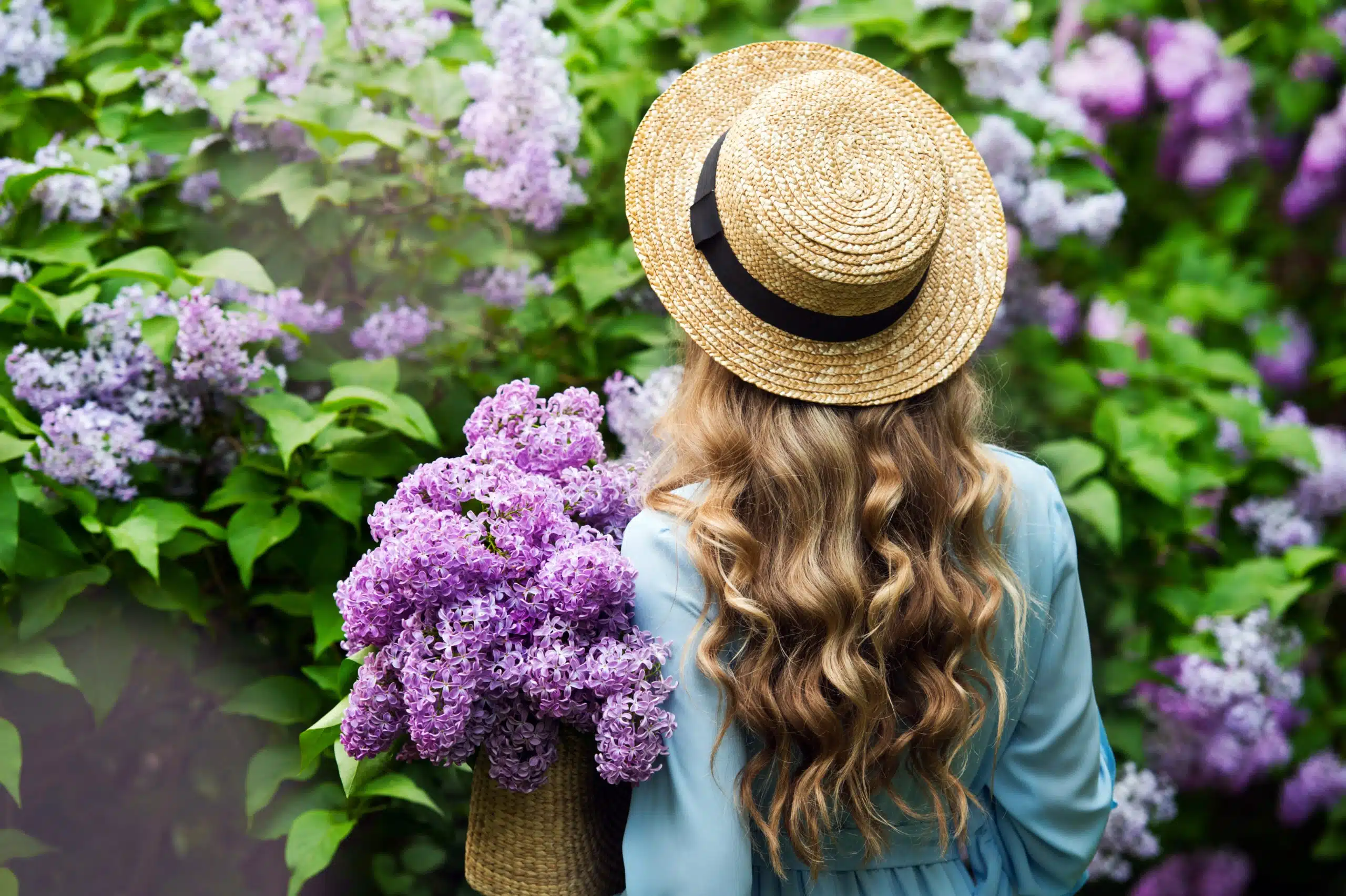
“Song — O Were My Love You Lilac Fair” by Robert Burns
O were my love yon Lilac fair,
Wi’ purple blossoms to the Spring,
And I, a bird to shelter there,
When wearied on my little wing!
How I wad mourn when it was torn
By Autumn wild, and Winter rude!
But I wad sing on wanton wing,
When youthfu’ May its bloom renew’d.
O gin my love were yon red rose,
That grows upon the castle wa’;
And I myself a drap o’ dew,
Into her bonie breast to fa’!
O there, beyond expression blest,
I’d feast on beauty a’ the night;
Seal’d on her silk-saft faulds to rest,
Till fley’d awa by Phoebus’ light!
From “A Dream of Love” by Walter von der Vogelweide
Look, this is why I feel so gay:
I have grown warm with cheer,
Clasped by a dream so dear.
Alas, I had to wake, for it was day.
Hear what she has done unto me:
All the summer I must peer
Into ladies’ eyes to see
If I can find my dear: then sorrow’s end were near.
Maybe she is going to this dance.
Ladies, I beg you, be so kind,
Push back your hats, if you don’t mind!
If I should find her ’neath this wreath by chance!
“Love’s Lovers” by Dante Gabriel Rossetti
Some ladies love the jewels in Love’s zone
And gold-tipped darts he hath for painless play
In idle scornful hours he flings away;
And some that listen to his Lute’s soft tone
Do love to vaunt the silver praise their own;
Some prize his blindfold sight; and there be they
Who kissed his wings which brought him yesterday
And thank his wings to-day that he is flown.
My lady only loves the heart of Love:
Therefore Love’s heart, my lady, hath for thee
His bower of unimagined flower and tree:
There kneels he now, and all-anhungered of
Thine eyes grey-lit in shadowing hair above,
Seals with thy mouth his immortality.
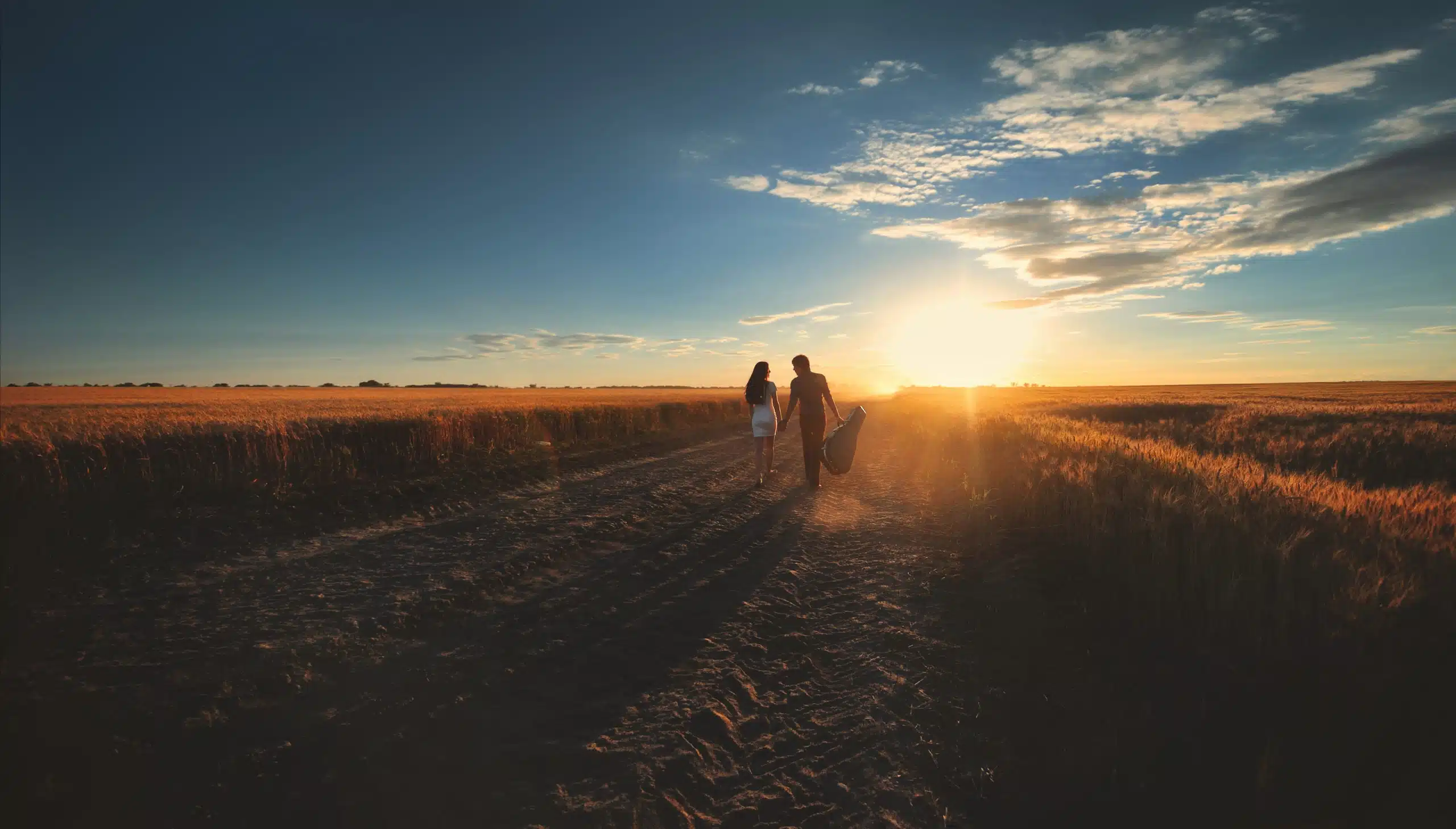
“I Am Thine” by Anonymous (12th century)
I am thine, thou art mine,
And this shall be a sure sign:
Locked fast thou art
Within my heart,
And lost forever is the key;
So thou inside must ever be.
“How Do I Love Thee?” by Elizabeth Barrett Browning
How do I love thee? Let me count the ways.
I love thee to the depth and breadth and height
My soul can reach, when feeling out of sight
For the ends of being and ideal grace.
I love thee to the level of every day’s
Most quiet need, by sun and candle-light.
I love thee freely, as men strive for right.
I love thee purely, as they turn from praise.
I love thee with the passion put to use
In my old griefs, and with my childhood’s faith.
I love thee with a love I seemed to lose
With my lost saints. I love thee with the breath,
Smiles, tears, of all my life; and, if God choose,
I shall but love thee better after death.
“My Loves” by Langston Hughes
I love to see the big white moon,
A-shining in the sky;
I love to see the little stars,
When the shadow clouds go by.
I love the rain drops falling
On my roof-top in the night;
I love the soft wind’s sighing,
Before the dawn’s gray light.
I love the deepness of the blue,
In my Lord’s heaven above;
But better than all these things I think,
I love my lady love.

“Random Thoughts Of Her” by John Rollin Ridge
I gaze into her eyes—their tender light,
And strong, illumes my spirit’s darkest night,
And pours rich glory on me as a star
Which brings its silver luster from afar.
Sweet thoughts and beautiful within me burn,
And heaven I see what way soe’er I turn;
In borrowed radiance of her soulful glance
All things grow tenfold lovely and entrance.
I touch her willing hand—as gentle dove
It rests within my own, in trusting love;
And yet it moves me with a power so deep,
My heart is flame, and all my pulses leap.
I breathe her name unto the flowers: they bloom
With rarer hues, and shed more rich perfume!
The skylark hears it, as he floats along,
And adds new sweetness to his morning song.
Oh magic name! deep graven on my heart,
And, as its owner, of myself a part!
It hath in all my daily thoughts a share,
And forms the burden of my nightly prayer!
“Amores (IV)” by E. E. Cummings
consider O
woman this
my body.
for it has
lain
with empty arms
upon the giddy hills
to dream of you,
approve these
firm unsated
eyes
which have beheld
night’s speechless carnival
the painting
of the dark
with meteors
streaming from playful
immortal hands
the bursting
of the wafted stars
(in time to come you shall
remember of this night amazing
ecstasies slowly,
in the glutted
heart fleet
flowerterrible
memories
shall
rise,slowly
return upon the
red elected lips
scaleless visions)
“A Line-storm Song” by Robert Frost
The line-storm clouds fly tattered and swift,
The road is forlorn all day,
Where a myriad snowy quartz stones lift,
And the hoof-prints vanish away.
The roadside flowers, too wet for the bee,
Expend their bloom in vain.
Come over the hills and far with me,
And be my love in the rain.
The birds have less to say for themselves
In the wood-world’s torn despair
Than now these numberless years the elves,
Although they are no less there:
All song of the woods is crushed like some
Wild, easily shattered rose.
Come, be my love in the wet woods; come,
Where the boughs rain when it blows.
There is the gale to urge behind
And bruit our singing down,
And the shallow waters aflutter with wind
From which to gather your gown.
What matter if we go clear to the west,
And come not through dry-shod?
For wilding brooch shall wet your breast
The rain-fresh goldenrod.
Oh, never this whelming east wind swells
But it seems like the sea’s return
To the ancient lands where it left the shells
Before the age of the fern;
And it seems like the time when after doubt
Our love came back amain.
Oh, come forth into the storm and rout
And be my love in the rain.

“The Heart Of The Woman” by W. B. Yeats
O what to me the little room
That was brimmed up with prayer and rest;
He bade me out into the gloom,
And my breast lies upon his breast.
O what to me my mother’s care,
The house where I was safe and warm;
The shadowy blossom of my hair
Will hide us from the bitter storm.
O hiding hair and dewy eyes,
I am no more with life and death,
My heart upon his warm heart lies,
My breath is mixed into his breath.
“My Valentine” by George W. Doneghy
I.
I passed her on the crowded street–
This winsome maid, demure and sweet–
And envious saw the silken tresses
That seemed to give her cheeks caresses,
And rapture felt that thrilled me through
When on me glanced those eyes of blue
From underneath the drooping lashes
That could not hide their azure flashes!
And oh, I dreampt of bliss divine
If she would be–my Valentine!
II.
And visions of as fair a face
As painter’s pencil e’er did trace
Would haunt the mind each waking hour,
And slumber owned its magic power–
Until I found by merest chance
That belladonna made the glance,
And borrowed hair had lent its aid
For silken tresses of this maid–
And padding–paint–did all combine
To make for me–my Valentine!
“Romance” by Edgar Allan Poe
Romance, who loves to nod and sing,
With drowsy head and folded wing,
Among the green leaves as they shake
Far down within some shadowy lake,
To me a painted paroquet
Hath been—a most familiar bird—
Taught me my alphabet to say—
To lisp my very earliest word
While in the wild wood I did lie,
A child—with a most knowing eye.
Of late, eternal Condor years
So shake the very Heaven on high
With tumult as they thunder by,
I have no time for idle cares
Through gazing on the unquiet sky.
And when an hour with calmer wings
Its down upon thy spirit flings—
That little time with lyre and rhyme
To while away—forbidden things!
My heart would feel to be a crime
Unless it trembled with the strings.
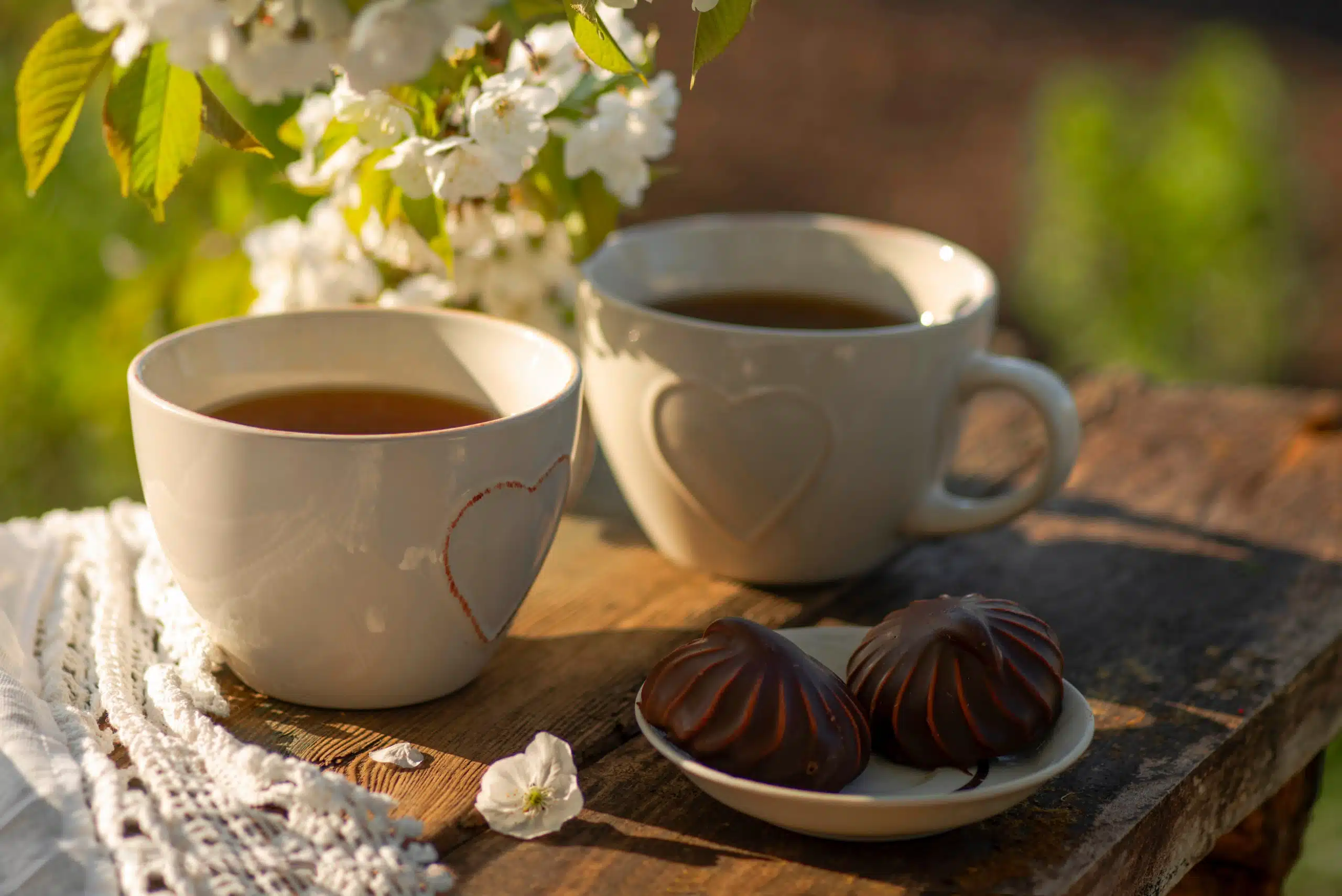
“To Her I Love” by James Thomson
Tell me, thou soul of her I love,
Ah! tell me, whither art thou fled;
To what delightful world above,
Appointed for the happy dead?
Or dost thou, free, at pleasure, roam
And sometimes share thy lover’s woe;
Where, void of thee, his cheerless home
Can now, alas! no comfort know?
Oh! if thou hoverest round my walk,
While, under every well-known tree,
I to thy fancied shadow talk,
And every tear is full of thee;
Should then the weary eye of grief,
Beside some sympathetic stream,
In slumber find a short relief,
Oh! visit thou my soothing dream!
“She Was A Phantom Of Delight” by William Wordsworth
She was a Phantom of delight
When first she gleamed upon my sight;
A lovely Apparition, sent
To be a moment’s ornament;
Her eyes as stars of Twilight fair;
Like Twilight’s, too, her dusky hair;
But all things else about her drawn
From May-time and the cheerful Dawn;
A dancing Shape, an Image gay,
To haunt, to startle, and way-lay.
I saw her upon nearer view,
A Spirit, yet a Woman too!
Her household motions light and free,
And steps of virgin-liberty;
A countenance in which did meet
Sweet records, promises as sweet;
A Creature not too bright or good
For human nature’s daily food;
For transient sorrows, simple wiles,
Praise, blame, love, kisses, tears, and smiles.
And now I see with eye serene
The very pulse of the machine;
A Being breathing thoughtful breath,
A Traveller between life and death;
The reason firm, the temperate will,
Endurance, foresight, strength, and skill;
A perfect Woman, nobly planned,
To warn, to comfort, and command;
And yet a Spirit still, and bright
With something of angelic light.
“My Thoughts of Ye” by Victor-Marie Hugo
What do I dream of? Far from the low roof,
Where now ye are, children, I dream of you;
Of your young heads that are the hope and crown
Of my full summer, ripening to its fall.
Branches whose shadow grows along my wall,
Sweet souls scarce open to the breath of day,
Still dazzled with the brightness of your dawn.
I dream of those two little ones at play,
Making the threshold vocal with their cries,
Half tears, half laughter, mingled sport and strife,
Like two flowers knocked together by the wind.
Or of the elder two – more anxious thought –
Breasting already broader waves of life,
A conscious innocence on either face,
My pensive daughter and my curious boy.
Thus do I dream, while the light sailors sing,
At even moored beneath some steepy shore,
While the waves opening all their nostrils breathe
A thousand sea-scents to the wandering wind,
And the whole air is full of wondrous sounds,
From sea to strand, from land to sea, given back
Alone and sad, thus do I dream of you.
Children, and house and home, the table set,
The glowing hearth, and all the pious care
Of tender mother, and of grandsire kind;
And while before me, spotted with white sails,
The limpid ocean mirrors all the stars,
And while the pilot, from the infinite main,
Looks with calm eye into the infinite heaven,
I dreaming of you only, seek to scan
And fathom all my soul’s deep love for you –
Love sweet, and powerful, and everlasting –
And find that the great sea is small beside it.
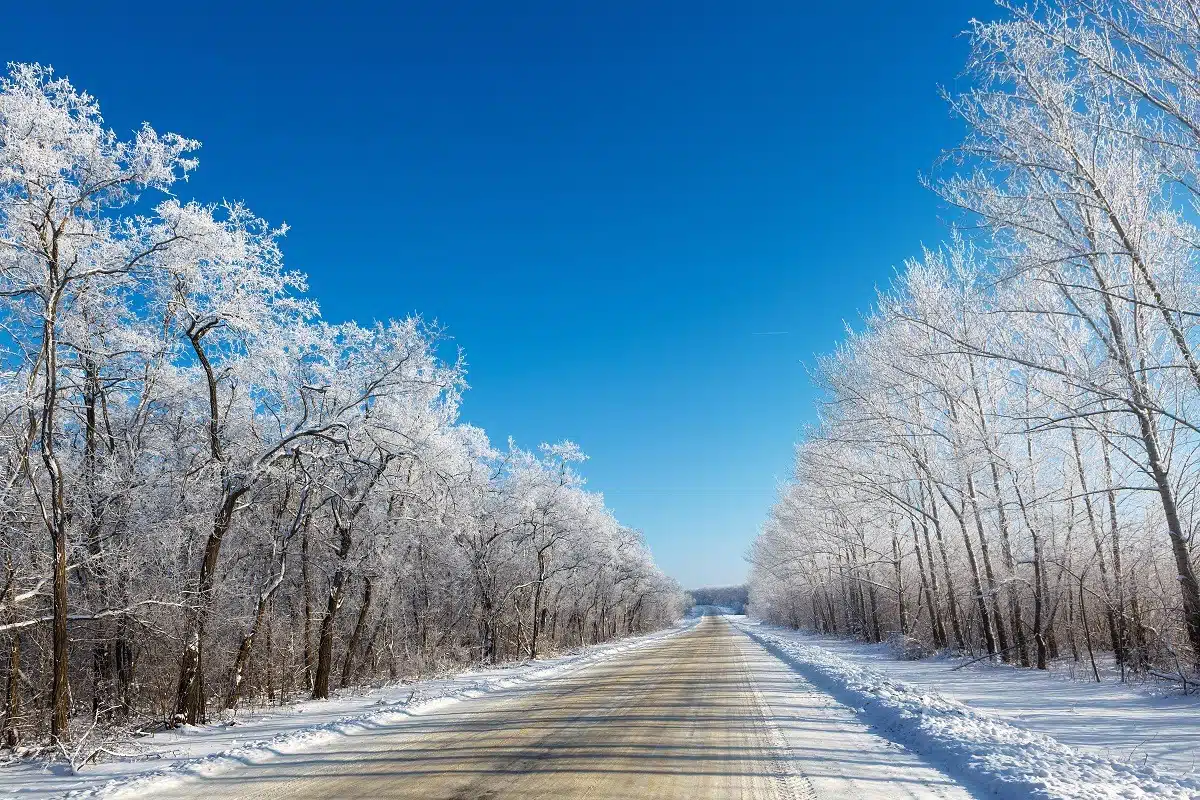
“My Sweetest Lesbia” by Thomas Campion
My sweetest Lesbia, let us live and love,
And though the sager sort our deeds reprove,
Let us not weigh them. Heaven’s great lamps do dive
Into their west, and straight again revive,
But soon as once set is our little light,
Then must we sleep one ever-during night.
If all would lead their lives in love like me,
Then bloody swords and armor should not be;
No drum nor trumpet peaceful sleeps should move,
Unless alarm came from the camp of love.
But fools do live, and waste their little light,
And seek with pain their ever-during night.
When timely death my life and fortune ends,
Let not my hearse be vexed with mourning friends,
But let all lovers, rich in triumph, come
And with sweet pastimes grace my happy tomb;
And Lesbia, close up thou my little light,
And crown with love my ever-during night.
“To A Kiss” by Robert Burns
Humid seal of soft affections,
Tend’rest pledge of future bliss,
Dearest tie of young connections,
Love’s first snow-drop, virgin kiss.
Speaking silence, dumb confession,
Passion’s birth, and infants’ play,
Dove-like fondness, chaste concession,
Glowing dawn of brighter day.
Sorrowing joy, adieu’s last action,
Ling’ring lips, — no more to join!
What words can ever speak affection
Thrilling and sincere as thine!
“Autumn Love” by Lord de Tabley (John Byrne Leicester Warren)
The autumn brought my love to me.
The birds sing not in spring alone;
For fancy all the year is free
To find a sweetness of its own:
And sallow woods and crystal morn
Were sweeter than the budded thorn.
When redwings peopled brake and down
I kissed her mouth: in morning air
The rosy clover dried to brown
Beneath thro’ all its glowing square.
Around the bramble berries set
Their beaded globes intenser jet.
“True love,” I whispered, “when I fold
To mine thy little lips so sweet,
The headland trembles into gold,
The sun goes up on firmer feet,
And drenched in glory one by one
The terrace clouds will melt and run.
Our lips are close as doves in nest;
And life in strength flows everywhere
In larger pulses through the breast
That breathe with thine a mutual air.
My nature almost shrinks to be
In this great moment’s ecstasy.
“Lo, yonder myriad-tinted wood,
With all its phases golden-brown,
Lies calm; as if it understood
That in the flutter of thy gown
Abides a wonder more to me
Than lustrous leagues of forest sea.
“And far and deep we heard the sound
And low of pasture-going kine.
Your trembling lips spake not: I found
Their silence utterly divine.
Again the fluttering accents crept
Between them, failed, then how you wept!
“For when you came to speak the part
Which gave yourself for time and years,
The angel in the maiden heart
Could find no other speech but tears.
And their immortal language told
What Seraph’s words to speak were cold.
“We turned our homeward feet at last,
And kissed to go, but kissed and stayed.
The dewy meadows where we past
Seemed love-full to each grass’s blade.
And there our thirsty lips retold
That lovers’ story ages old.
“They say we sear with growing time,
And scorn in age our young romance:
Yet shall that morning keep its prime
Thro’ every earthly shock and chance:
And till my brain is dark with death,
No sweetness leaves that morning breath.”

“The Lover” by Coventry Patmore
He meets, by heavenly chance express,
The destined maid; some hidden hand
Unveils to him that loveliness
Which others cannot understand.
His merits in her presence grow,
To match the promise in her eyes,
And round her happy footsteps blow
The authentic airs of Paradise.
For joy of her he cannot sleep;
Her beauty haunts him all the night;
It melts his heart, it makes him weep
For wonder, worship, and delight.
O, paradox of love, he longs,
Most humble when he most aspires,
To suffer scorn and cruel wrongs
From her he honours and desires.
Her graces make him rich, and ask
No guerdon; this imperial style
Affronts him; he disdains to bask,
The pensioner of her priceless smile.
He prays for some hard thing to do,
Some work of fame and labour immense,
To stretch the languid bulk and thew
Of love’s fresh-born magnipotence.
No smallest boon were bought too dear,
Though barter’d for his love-sick life;
Yet trusts he, with undaunted cheer,
To vanquish heaven, and call her Wife.
He notes how queens of sweetness still
Neglect their crowns, and stoop to mate;
How, self-consign’d with lavish will,
They ask but love proportionate;
How swift pursuit by small degrees,
Love’s tactic, works like miracle;
How valour, clothed in courtesies,
Brings down the haughtiest citadel;
And therefore, though he merits not
To kiss the braid upon her skirt,
His hope, discouraged ne’er a jot,
Out-soars all possible desert.
“The Good-Morrow” by Haywood
Pack, clouds, away, and welcome day,
With night we banish sorrow;
Sweet air blow soft, mount, larks, aloft,
To give my love good-morrow!
Wings from the wind, to please her mind,
Notes from the lark I’ll borrow;
Bird, prune thy wing, nightingale sing,
To bid my love good-morrow.
Wake from thy nest, robin red-breast,
Sing, birds, in every furrow;
And from each hill let music shrill,
Give my sweet love good-morrow.
Blackbird and thrush in every bush,
Stare, linnet and cock-sparrow;
You pretty elves, among yourselves
Sing my fair love good-morrow!
Love Poems and Sonnets By Shakespeare
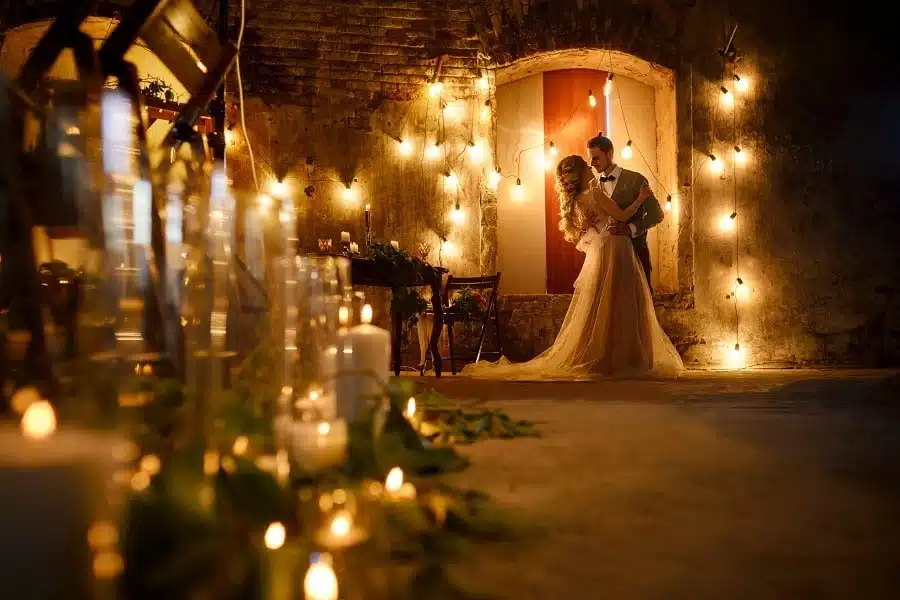
“Sonnet 102” by William Shakespeare
My love is strengthened, though more weak in seeming;
I love not less, though less the show appear.
That love is merchandised whose rich esteeming
The owner’s tongue doth publish everywhere.
Our love was new, and then but in the spring,
When I was wont to greet it with my lays,
As Philomel in summer’s front doth sing,
And stops his pipe in growth of riper days.
Not that the summer is less pleasant now
Than when her mournful hymns did hush the night,
But that wild music burthens every bough,
And sweets grown common lose their dear delight.
Therefore, like her, I sometime hold my tongue,
Because I would not dull you with my song.
“Sonnet 57” by William Shakespeare
Being your slave, what should I do but tend
Upon the hours and times of your desire?
I have no precious time at all to spend,
Nor services to do, till you require.
Nor dare I chide the world-without-end hour
Whilst I, my sovereign, watch the clock for you,
Nor think the bitterness of absence sour
When you have bid your servant once adieu;
Nor dare I question with my jealous thought
Where you may be, or your affairs suppose,
But, like a sad slave, stay and think of nought
Save, where you are how happy you make those.
So true a fool is love that in your will,
Though you do any thing, he thinks no ill.
“In Loving Thee Thou Know’St I Am Forsworn” by William Shakespeare
In loving thee thou know’st I am forsworn,
But thou art twice forsworn, to me love swearing.
In act thy bed-vow broke and new faith torn
In vowing new hate after new love bearing.
But why of two oaths’ breach do I accuse thee,
Why I break twenty? I am perjured most;
For all my vows are oaths but to misuse thee
And all my honest faith in thee is lost,
For I have sworn deep oaths of thy deep kindness,
Oaths of thy love, thy truth, thy constancy,
And, to enlighten thee, gave eyes to blindness,
Or made them swear against the thing they see;
For I have sworn thee fair; more perjured I,
To swear against the truth so foul a lie!

“Sonnet 130” by William Shakespeare
My mistress’ eyes are nothing like the sun;
Coral is far more red than her lips’ red;
If snow be white, why then her breasts are dun;
If hairs be wires, black wires grow on her head.
I have seen roses damask’d, red and white,
But no such roses see I in her cheeks;
And in some perfumes is there more delight
Than in the breath that from my mistress reeks.
I love to hear her speak, yet well I know
That music hath a far more pleasing sound;
I grant I never saw a goddess go;
My mistress, when she walks, treads on the ground:
And yet, by heaven, I think my love as rare
As any she belied with false compare.
“Sonnet 116” by William Shakespeare
Let me not to the marriage of true minds
Admit impediments. Love is not love
Which alters when it alteration finds,
Or bends with the remover to remove.
O no, it is an ever-fixèd mark
That looks on tempests and is never shaken;
It is the star to every wand’ring bark,
Whose worth’s unknown, although his height be taken.
Love’s not time’s fool, though rosy lips and cheeks
Within his bending sickle’s compass come:
Love alters not with his brief hours and weeks,
But bears it out even to the edge of doom.
If this be error and upon me proved,
I never writ, nor no man ever loved.
“Carpe Diem” by William Shakespeare
O mistress mine, where are you roaming?
O stay and hear! your true-love’s coming
That can sing both high and low;
Trip no further, pretty sweeting,
Journey’s end in lovers’ meeting—
Every wise man’s son doth know.
What is love? ’tis not hereafter;
Present mirth hath present laughter;
What’s to come is still unsure:
In delay there lies no plenty,—
Then come kiss me, sweet and twenty,
Youth’s a stuff will not endure.
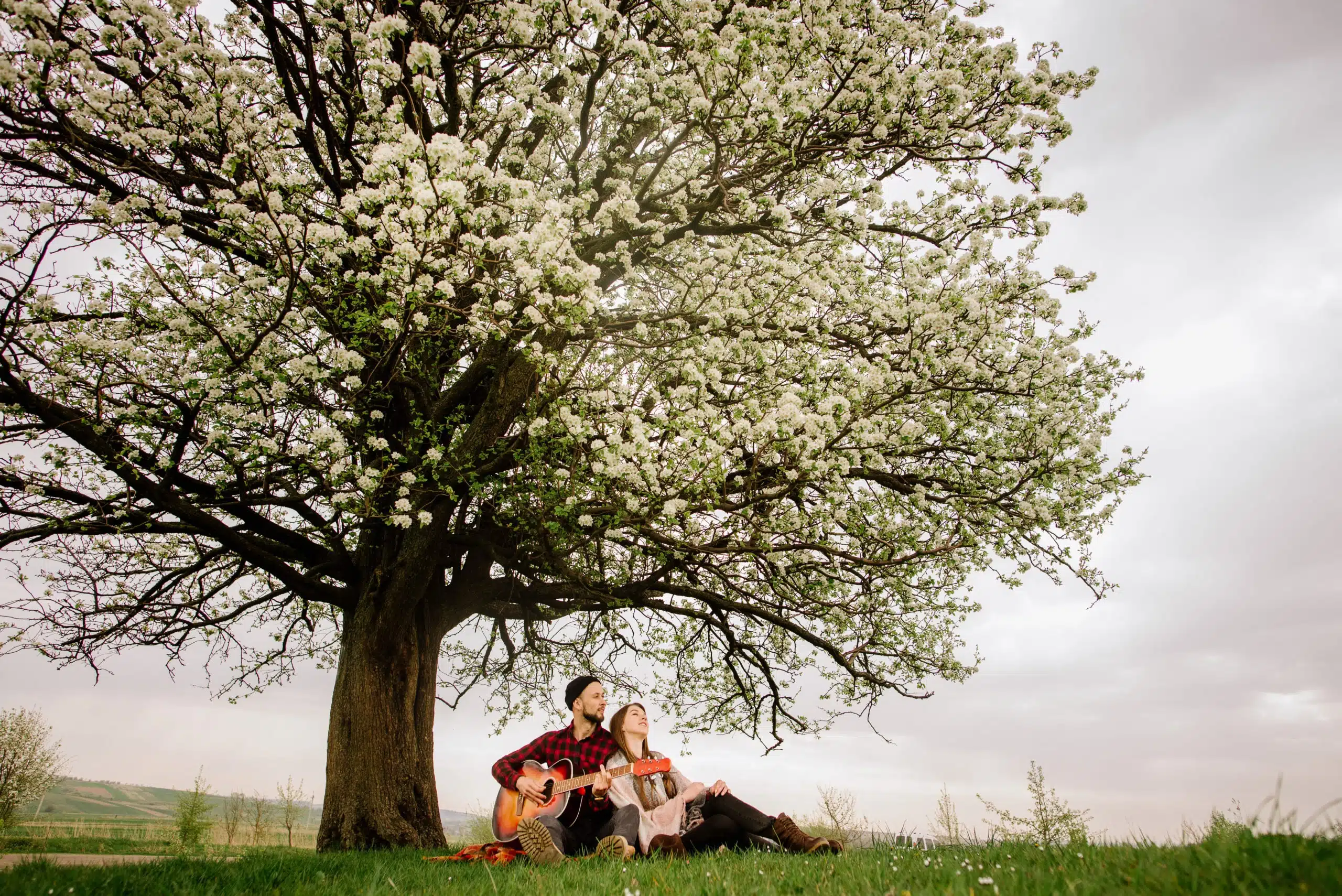
“Under The Greenwood Tree” by William Shakespeare
Under the greenwood tree
Who loves to lie with me,
And turn his merry note
Unto the sweet bird’s throat,
Come hither, come hither, come hither:
Here shall he see
No enemy
But winter and rough weather.
Who doth ambition shun,
And loves to live i’ the sun,
Seeking the food he eats,
And pleas’d with what he gets,
Come hither, come hither, come hither:
Here shall he see
No enemy
But winter and rough weather.
“Sonnet 23” by William Shakespeare
As an unperfect actor on the stage,
Who with his fear is put besides his part,
Or some fierce thing replete with too much rage,
Whose strength’s abundance weakens his own heart;
So I, for fear of trust, forget to say
The perfect ceremony of love’s rite,
And in mine own love’s strength seem to decay,
O’ercharg’d with burden of mine own love’s might.
O, let my books be then the eloquence
And dumb presagers of my speaking breast;
Who plead for love, and look for recompense,
More than that tongue that more hath more express’d.
O, learn to read what silent love hath writ:
To hear with eyes belongs to love’s fine wit.
“Sonnet 37” by William Shakespeare
As a decrepit father takes delight
To see his active child do deeds of youth,
So I, made lame by fortune’s dearest spite,
Take all my comfort of thy worth and truth.
For whether beauty, birth, or wealth, or wit,
Or any of these all, or all, or more,
Entitled in thy parts do crownèd sit,
I make my love engrafted to this store.
So then I am not lame, poor, nor despised,
Whilst that this shadow doth such substance give
That I in thy abundance am sufficed,
And by a part of all thy glory live.
Look what is best, that best I wish in thee.
This wish I have; then ten times happy me.
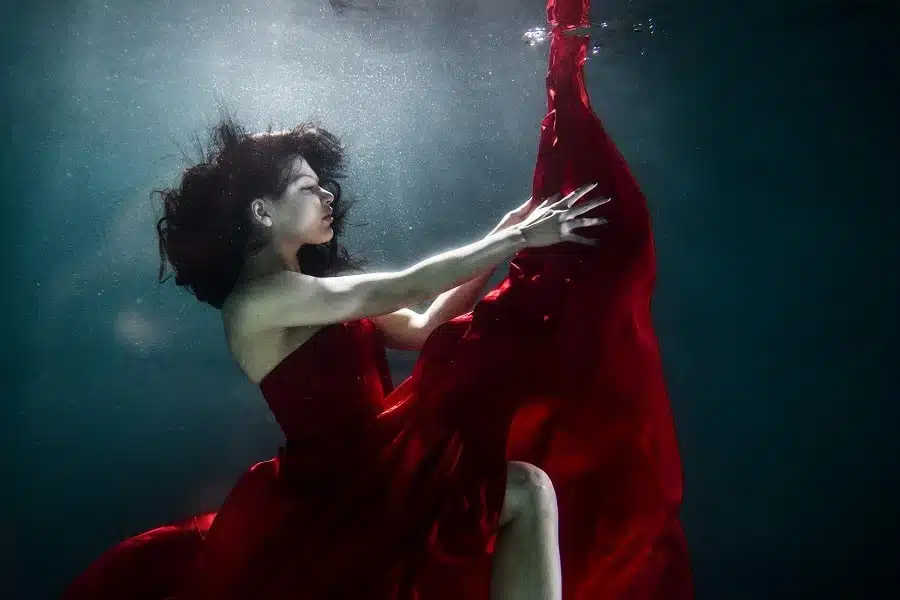
“Sonnet 29” by William Shakespeare
When, in disgrace with fortune and men’s eyes,
I all alone beweep my outcast state
And trouble deaf heaven with my bootless cries
And look upon myself and curse my fate,
Wishing me like to one more rich in hope,
Featured like him, like him with friends possess’d,
Desiring this man’s art and that man’s scope,
With what I most enjoy contented least;
Yet in these thoughts myself almost despising,
Haply I think on thee, and then my state,
Like to the lark at break of day arising
From sullen earth, sings hymns at heaven’s gate;
For thy sweet love remember’d such wealth brings
That then I scorn to change my state with kings.
“Sonnet 47” by William Shakespeare
Betwixt mine eye and heart a league is took,
And each doth good turns now unto the other.
When that mine eye is famished for a look,
Or heart in love with sighs himself doth smother,
With my love’s picture then my eye doth feast
And to the painted banquet bids my heart.
Another time mine eye is my heart’s guest,
And in his thoughts of love doth share a part.
So either by thy picture or my love,
Thyself away are present still with me;
For thou no farther than my thoughts canst move,
And I am still with them, and they with thee;
Or if they sleep, thy picture in my sight
Awakes my heart to heart’s and eye’s delight.
“Sonnet 61” by William Shakespeare
Is it thy will thy image should keep open
My heavy eyelids to the weary night?
Dost thou desire my slumbers should be broken,
While shadows like to thee do mock my sight?
Is it thy spirit that thou send’st from thee
So far from home into my deeds to pry,
To find out shames and idle hours in me,
The scope and tenor of thy jealousy?
O no; thy love, though much, is not so great.
It is my love that keeps mine eye awake,
Mine own true love that doth my rest defeat,
To play the watchman ever for thy sake.
For thee watch I whilst thou dost wake elsewhére,
From me far off, with others all too near.
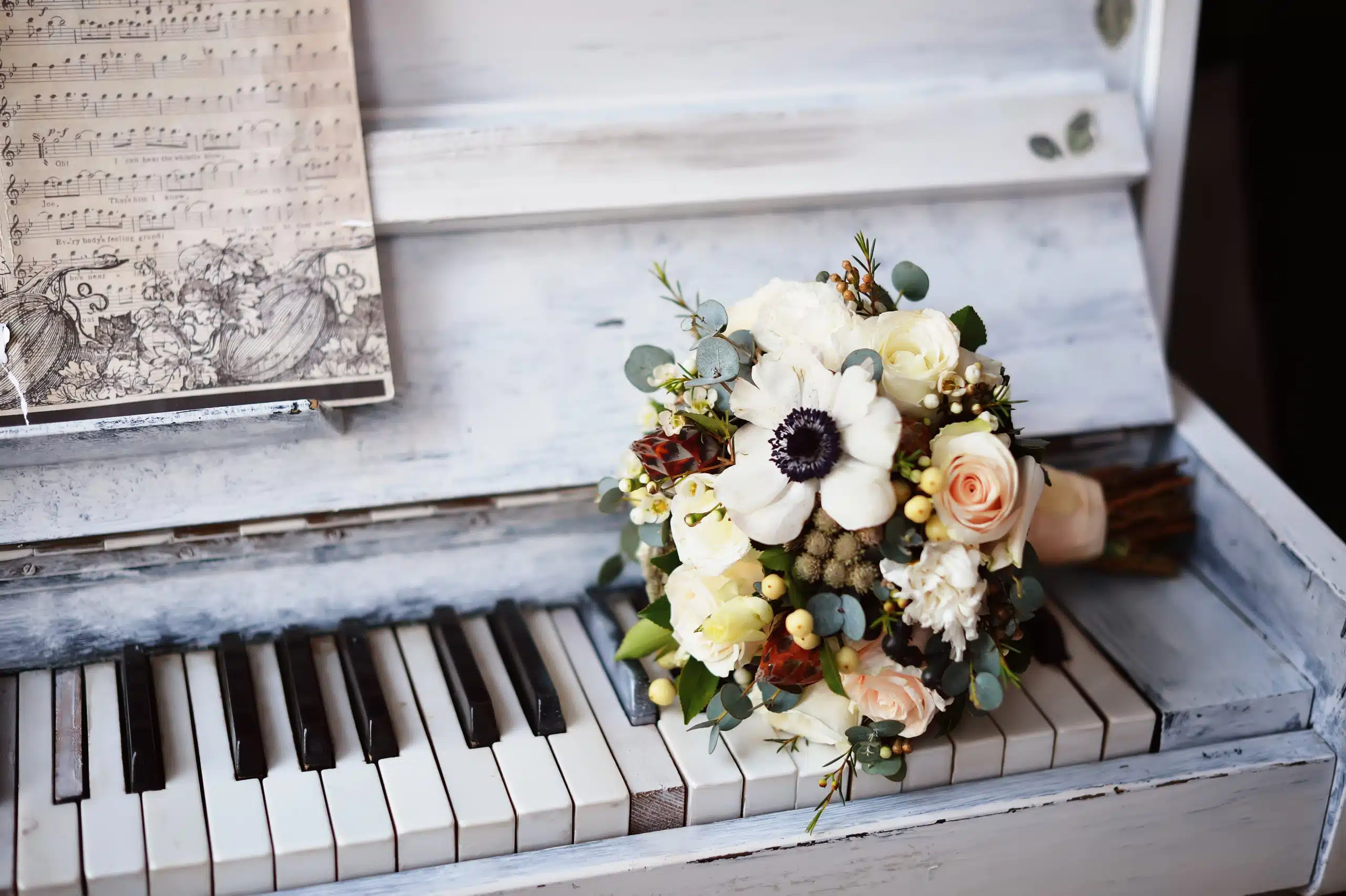
“Bridal Song” by William Shakespeare
Roses, their sharp spines being gone,
Not royal in their smells alone,
But in their hue;
Maiden pinks, of odour faint,
Daisies smell-less, yet most quaint,
And sweet thyme true;
Primrose, firstborn child of Ver;
Merry springtime’s harbinger,
With her bells dim;
Oxlips in their cradles growing,
Marigolds on death-beds blowing,
Larks’-heels trim;
All dear Nature’s children sweet
Lie ‘fore bride and bridegroom’s feet,
Blessing their sense!
Not an angel of the air,
Bird melodious or bird fair,
Be absent hence!
The crow, the slanderous cuckoo, nor
The boding raven, nor chough hoar,
Nor chattering pye,
May on our bride-house perch or sing,
Or with them any discord bring,
But from it fly!
“Sonnet 18” by William Shakespeare
Shall I compare thee to a summer’s day?
Thou art more lovely and more temperate.
Rough winds do shake the darling buds of May,
And summer’s lease hath all too short a date.
Sometime too hot the eye of heaven shines,
And often is his gold complexion dimmed;
And every fair from fair sometime declines,
By chance, or nature’s changing course, untrimmed;
But thy eternal summer shall not fade,
Nor lose possession of that fair thou ow’st,
Nor shall death brag thou wand’rest in his shade,
When in eternal lines to Time thou grow’st.
So long as men can breathe, or eyes can see,
So long lives this, and this gives life to thee.
Deep Love Poems For Her By Edmund Spenser

“Ice and Fire” by Edmund Spenser
My love is like to ice, and I to fire:
How comes it then that this her cold so great
Is not dissolved through my so hot desire,
But harder grows the more I her entreat?
Or how comes it that my exceeding heat
Is not allayed by her heart-frozen cold,
But that I burn much more in boiling sweat,
And feel my flames augmented manifold?
What more miraculous thing may be told,
That fire, which all things melts, should harden ice,
And ice, which is congeal’d with senseless cold,
Should kindle fire by wonderful device?
Such is the power of love in gentle mind,
That it can alter all the course of kind.
“Amoretti XXII: This Holy Season” by Edmund Spenser
This holy season, fit to fast and pray,
Men to devotion ought to be inclin’d:
Therefore I likewise on so holy day,
For my sweet saint some service fit will find.
Her temple fair is built within my mind,
In which her glorious image placed is,
On which my thoughts do day and night attend,
Like sacred priests that never think amiss.
There I to her as th’ author of my bliss,
Will build an altar to appease her ire:
And on the same my heart will sacrifice,
Burning in flames of pure and chaste desire:
The which vouchsafe, O goddess, to accept,
Amongst thy dearest relics to be kept.
“Amoretti LXXIX: Men Call You Fair” by Edmund Spenser
Men call you fair, and you do credit it,
For that your self ye daily such do see:
But the true fair, that is the gentle wit,
And vertuous mind, is much more prais’d of me.
For all the rest, how ever fair it be,
Shall turn to naught and lose that glorious hue:
But only that is permanent and free
From frail corruption, that doth flesh ensue.
That is true beauty: that doth argue you
To be divine, and born of heavenly seed:
Deriv’d from that fair Spirit, from whom all true
And perfect beauty did at first proceed.
He only fair, and what he fair hath made,
All other fair, like flowers untimely fade.

“Sonnet 75” by Edmund Spenser
One day I wrote her name upon the strand,
But came the waves and washed it away:
Agayne I wrote it with a second hand,
But came the tyde, and made my paynes his pray.
“Vayne man,” sayd she, “that doest in vaine assay.
A mortall thing so to immortalize,
For I my selve shall lyke to this decay,
and eek my name bee wyped out lykewize.”
“Not so,” quod I, “let baser things devize,
To dy in dust, but you shall live by fame:
My verse your vertues rare shall eternize,
And in the heavens wryte your glorious name.
Where whenas death shall all the world subdew,
Our love shall live, and later life renew.”
“Amoretti III: The Sovereign Beauty” by Edmund Spenser
The sovereign beauty which I do admire,
Witness the world how worthy to be praised:
The light whereof hath kindled heavenly fire
In my frail spirit, by her from baseness raised;
That being now with her huge brightness dazed,
Base thing I can no more endure to view;
But looking still on her, I stand amazed
At wondrous sight of so celestial hue.
So when my tongue would speak her praises due,
It stopped is with thought’s astonishment:
And when my pen would write her titles true,
It ravish’d is with fancy’s wonderment:
Yet in my heart I then both speak and write
The wonder that my wit cannot endite.
